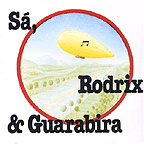 Sa, Rodrix & Guarabira "Sa, Rodrix & Guarabira" (EMI, 2003)
Sa, Rodrix & Guarabira "Sa, Rodrix & Guarabira" (EMI, 2003)
Although patently derivative of psychedelic forerunners such as Os Mutantes and the other tropicalistas, this group is still worth checking out for their melody-driven riffs and devotion to American-style rock'n'roll. This disc combines the trio's first two albums, Passado, Presente E Futuro (1971) and Terra (1973), music made with an abundance of '50s-style rock rhythms, as well as an experimental edge that sets them apart from the formulaic jovem guarda rockers of the previous decade. At times it sounds a little forced, but still can be captivating, especially if you give it more than one chance. Kind of a curio, but still pretty cool. Gutemberg Guarabira and Luiz Carlos Sa went on to record more straightforward pop material in the '70s and '80s, but nothing as striking as this... Ze Rodrix went solo, although he continued to collaborate with them on various projects...
 Sa, Rodrix & Guarabira "Passado, Presente E Futuro" (Odeon, 1971) (LP)
Sa, Rodrix & Guarabira "Passado, Presente E Futuro" (Odeon, 1971) (LP)
 Sa, Rodrix & Guarabira "Terra" (Odeon, 1973)
Sa, Rodrix & Guarabira "Terra" (Odeon, 1973)
 Sa, Rodrix & Guarabyra "Outra Vez Na Estrada" (Som Livre, 2001)
Sa, Rodrix & Guarabyra "Outra Vez Na Estrada" (Som Livre, 2001)
 Sa, Rodrix & Guarabyra "Amanha" (2006)
Sa, Rodrix & Guarabyra "Amanha" (2006)
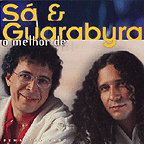 Sa & Guarabyra "O Melhor De..." (BMG-RCA, 1997)
Sa & Guarabyra "O Melhor De..." (BMG-RCA, 1997)
This best-of set covers the work Gutemberg Guarabira and Luiz Carlos Sa did for the RCA label between 1977-88... It's inoffensive, unmemorable pop material, though judging from the sprinkling of tracks from a 1983 live album, they definitely had their fans. Didn't do much for me, though.
 Roberta Sa "Braseiro" (Universal-Brasil, 2005)
Roberta Sa "Braseiro" (Universal-Brasil, 2005)
 Roberta Sa "Belo Estranho Dia Pra Se Ter Alegria" (Universal-Brasil, 2007)
Roberta Sa "Belo Estranho Dia Pra Se Ter Alegria" (Universal-Brasil, 2007)
 Roberta Sa "Pra Se Ter Alegria: Ao Vivo" (Universal-Brasil, 2009)
Roberta Sa "Pra Se Ter Alegria: Ao Vivo" (Universal-Brasil, 2009)
 Roberta Sa & Trio Madeira "Quando O Canto E Reza" (Universal-Brasil, 2011)
Roberta Sa & Trio Madeira "Quando O Canto E Reza" (Universal-Brasil, 2011)
Wanda Sa - See artist discography
Rubao Sabino "Sabao Rubino" (Retoque Solo, 1988)
Sabrina "Eu Sou Eu" (CBS, 1978) (LP)
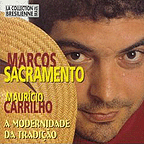 Marcos Sacramento & Mauricio Carrilho "A Modernidade Da Tradicao" (Buda Musique, 1994)
Marcos Sacramento & Mauricio Carrilho "A Modernidade Da Tradicao" (Buda Musique, 1994)
A pleasant, but unchallenging, acoustic set. Features sprightly acoustic versions songs by several well-known MPB, samba and choro songwriters, including Chico Buarque, Nelson Cavaquinho, Caetano Veloso and Paulinho Da Viola. Classical guitar, smooth vocals and light percussion.
Marcos Sacramento "Caracane" (Dabliu, 1998)
Marcos Sacramento & Carlos Fuchs "Fossa Nova" (Olho Do Tempo, 2006)
Marcos Sacramento "Sacramentos" (Biscoito Fino, 2007)
Sala Especial "Sala Especial" (Bizarre, 2000)
Four cute, kinda garage-y, indie-rockin' instrumentals, built largely around a spy-jazzy electric organ and a perky, infectious beat. One track is a riff on an old bossa standard; other than that, this EP isn't particularly "Brazilian," but that track is clever and the rest is equally fun. Worth checking out.
Salinas "Paz, Amor E... Samba" (EMI-Copacabana, 1973) (LP)
(Produced by Milton Rodrigues)
Salinas "Atlantis" (Tapecar, 1974) (LP)
Monica Salmaso & Paulo Bellinati "Afro-Sambas" (GSP, 1997)
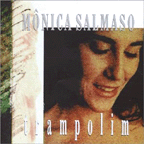 Monica Salmaso "Trampolim" (Blue Jackel Records, 1999)
Monica Salmaso "Trampolim" (Blue Jackel Records, 1999)
(Produced by Rodolfo Stroeter)
For the first half of this album, I was entranced by Salmaso's gorgeous voice, which is sort of like Gal Costa's, though tonally richer, and a little more sweet. Then, I started to notice how similar the songs all sounded, and after a while my attention started to drift. Produced by Rodolfo Stroeter, who also sculpted Gilberto Gil's awesome O Sol Oslo album, and has a similarly lavish, multi-textured sound, although it got little drippy towards the end. Nonetheless, Salmaso is a joy to listen to -- if you're looking for something mellow and dreamy, try this out.
Monica Salmaso "Voadeira" (Blue Jackel/Pau Brasil, 2002)
(Produced by Rodolfo Stroeter)
Continuing along the same path as Trampolim, this album is another intimate collaboration with producer Rodolfo Stroeter. It's elegaic and super-mellow, a bit sugary, though sure to please anyone with a relaxed, jazzy world music sweet-tooth.
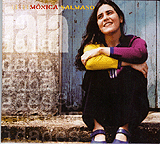 Monica Salmaso "Iaia" (Biscoito Fino/Adventure Music, 2004)
Monica Salmaso "Iaia" (Biscoito Fino/Adventure Music, 2004)
(Produced by Rodolfo Stroeter)
Quite nice! This album reached me and drew me in in a way that her previous albums did not... It's simpler, more relaxed, more direct, and more lively. Rodolfo Stroeter again produces, but with an eye towards rootsier styles, notably the choro vibe that predominates on many songs. The song selection is broad, encompassing the old-school bossa of Tom Jobim, more modern MPB by Chico Buarque, some traditional-leaning acoustic sambas and samba cancaoes, and even some more angular, offbeat material by Tom Ze and Jose Miguel Wisnik. Although Salmaso's vocals are less ethereal and mysterious than before, they are also more accessible, and more engaging. A very nice album... recommended!
Monica Salmaso "Noites De Gala, Samba Na Rua" (Biscoito Fino, 2007)
Monica Salmaso "Nem 1 Ai" (Biscoito Fino, 2008)
Monica Salmaso "Noites De Gala, Samba Na Rua -- Ao Vivo" (Biscoito Fino, 2009)
Dom Salvador - See artist discography
Iris Salvagnini "...E A Cancao De Marilia Medalha" (Tratore, 2008)
An homage to 1970's MPB singer Marilia Medalha...
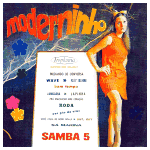 Samba 5 "Moderninho" (Tropicana, 1970) (LP)
Samba 5 "Moderninho" (Tropicana, 1970) (LP)
A cheapo budget-line album. Despite the name, this anonymous studio crew were more of a standard-issue lounge band than a samba group. The repertoire is a mix of classic 1960's bossa nova, MPB and tropicalia songs, but it's a plain-old pop-jazz/jazz fusion performance, with an electric organ as the main lead instrument -- more rock-oriented than Walter Wanderley, but still pretty dinner clubbish. These guys were okay; I'm not sure how much of a professional band they were... But they're enjoyable in a DIY-ish/easy listening way.
 Samba 6 "As Mais Pura Das Paixoes" (Continental, 1987)
Samba 6 "As Mais Pura Das Paixoes" (Continental, 1987)
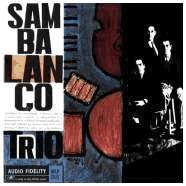 Sambalanco Trio "Sambalanco Trio" (Audio Fidelity, 1964)
Sambalanco Trio "Sambalanco Trio" (Audio Fidelity, 1964)
Pianist Cesar Camargo Mariano and percussionist Airto Moreira led this jazzy early-'60s trio; along with bassist Humberto Claiber they glided through more of that trademark breezy jazz sound that was the complimentary backdrop to the bossa nova boom. This is the first of the group's four albums, packed with many bossa standards and several of Camargo's originals, as well as "Homangem A Clifford Brown," a tribute to a North American smooth jazz player whose "Blues Walk" was a popular standard in the Braz-jazz scene. As with many of these groups, Sambalanco wasn't really on a par with most U.S. jazz bands, but they have a kitschy appeal, and have a more distinctively Brazilian flair than most. The piano work in particular deftly hints at a greater harmonic depth than actually comes through on the album. Worth checking out, particularly if you are a loungecore fan, or are interested in finding out about Airto's early roots.
Sambalanco Trio "Reencontro Com Sambalanco Trio" (Som Maior, 1965) (LP)
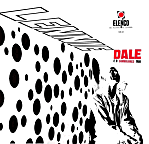 Sambalanco Trio & Lennie Dale "Lennie Dale E O Sambalanco Trio" (Elenco, 1965) (LP)
Sambalanco Trio & Lennie Dale "Lennie Dale E O Sambalanco Trio" (Elenco, 1965) (LP)
Here the trio backs American expatriate Lennie Dale, a cabaret crooner who was certainly in the right place at the right time, recording several albums with some of the top talent in the bossa-era nightclub scene. Dale sang in a Mel Torme style, mixing newly-minted bossa hits with a variety of American pop-jazz vocal tunes. It's a very vigorous production, but his vocals are a little too over-the-top for me -- too emotive and robust, and a bit too kitschy. But it's real-deal nightclub bossa, a good portrait of the era, though I don't think I honestly could have sat through one of his shows... He's just too irritating. (But then again, I don't care much for '50s-era crooners like Sinatra, Torme or Tony Bennett, either, and I think that's what Dale was shooting for... So take what I say with a grain of salt.)
Sambalanco Trio "Sambalanco Trio" (Som Maior, 1965) (LP)
Album title (aka "Nana")
Os Sambeatles "Os Sambeatles" (Fermata Records, 1966) (LP)
(Produced by Manoel Barenboim & John Kibelkatis)
Brisk, bright, unsubtle covers of a dozen early Beatles classics, with pert jazz combo backings that mostly serve to frame Manfredo Fest's piano plunking. I can't say this really stuck to my ribs or really resonated in any way, though there is a playful, Vince Guaraldi-type feel to his performance that's a little fun. Kitschy, though, mostly. The band name, of course, is a pun on the term used for samba musicians, sambistas. Hah. I get it now. Speaking of the band, alas the drummer and bassist are not identified.
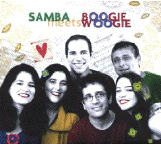 Samba Meets Boogie Woogie "Samba Meets Boogie Woogie" (Adventure Music, 2008)
Samba Meets Boogie Woogie "Samba Meets Boogie Woogie" (Adventure Music, 2008)
(Produced by Mariza & Mario Adnet)
A delicious tribute to the pre-bossa nova era, when Brazilian music was defined by the popular samba-cancao style, but also open to foreign influences such as North American "boogie woogie" blues, big band jazz, and also the florid romanticism of the Latin American bolero. This is a sweet, solid set featuring contributions by veterans of the modern bossa-jazz scene, including Miucha and Mario Adnet, Jovino Santos Neto, Ze Renato, Roberta Sa, Monica Salmaso and others. The song selection includes oldies by artists from the 1930s, '40s and '50s such as Haroldo Barbosa, Ciro Monteiro, Jackson Do Pandeiro and Os Cariocas. While it's mellow and slick enough to satisfy "smooth jazz" fans, it also has the deep historical grounding and a rootsy enough feel to appeal to folks like me who enjoy more rugged material. It's a very pleasant record, satisfying on a number of levels -- I also enjoyed the chatty, informative liner notes that tell about the origins of all these great golden oldies. Recommended!
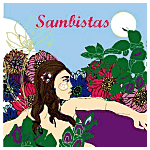 Os Sambistas "Os Sambistas" (Solid Air, 2008)
Os Sambistas "Os Sambistas" (Solid Air, 2008)
A classy set of old-school Brazilian MPB-samba songs, sung by some old-timers from the 1960s, such as Jair Rodrigues and Elza Soares, along with younger artists such as Luciana Mello and rising star Seu Jorge, all crooning and belting out lush, expansive ballads, amid large, colorful arrangements. At first the production seemed a bit bombastic and overripe, but this album pulled me in -- the backing isn't entirely my cup of tea, but the vocals are uniformly heartfelt and compelling. For MPB fans who like things a little slick and over the top, it doesn't get better than this. Recommended!
Os Sambistas Da Guanabara "O Show De Samba, v.1" (EMI-Odeon, 19--?) (LP)
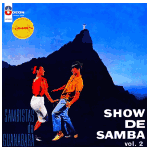 Os Sambistas Da Guanabara "O Show De Samba, v.2" (EMI-Odeon, 1964) (LP)
Os Sambistas Da Guanabara "O Show De Samba, v.2" (EMI-Odeon, 1964) (LP)
Although these performances include traditional samba percussion instruments (pandeiro, tamborim, etc.) it is the brassy big-band/orchestral arrangements that predominate. A glitzy, goofy easy listening outing with a sincere samba base, not too far below the surface. Still... it's a bit corny.
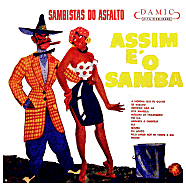 Os Sambistas Do Asfalto "Assim E O Samba" (Damic, 1960) (LP)
Os Sambistas Do Asfalto "Assim E O Samba" (Damic, 1960) (LP)
A fun set of nostalgic samba-cancao, covers of old songs by Atualfo Alves, Noel Rosa, Herivelto Martins and their generation of sambistas... A small, cheerful vocal group gets sympathetic backing from a group led by trombonist/bandleader Astor Silva, who tootles cheerfully on the sidelines... The "samba asfalto" genre was a fusion of old-school samba with more "citified" elements borrowed from the big band/orchestral branch of Brazilian pop. Sounds pretty good here! I'm not totally sure, but I'd guess that the "Marcal" listed in the percussionist is the same as Mestre Marcal, who recorded some killer batucada records in the 1970s... Anyone know for sure, or have more info about this group?
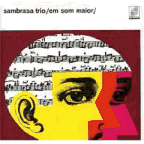 Sambrasa Trio "Sambrasa Trio Em Som Maior" (Som Maior, 1966) (LP)
Sambrasa Trio "Sambrasa Trio Em Som Maior" (Som Maior, 1966) (LP)
Airto Moreira and bassist Humberto Clayber on this jazz album; Airto is credited as composer on several songs... However, pianist Cesar Camargo Mariano has left the group for new ground. No worries: Braz-jazz madman Hermeto Pascoal fills the gap, on one of the first of his and Airto's long period of productive, innovative collaborations.

Cesar Sampaio "Historias De Amor" (Polydor, 1978) (LP)

Cesar Sampaio "Cesar Sampaio" (RGE, 1986) (LP)

Cesar Sampaio "Canta Sucessos De Antonio Marcos" (Universal, 2005)

Cesar Sampaio "O Melhor De" (Universal, 2002)
Sergio Sampaio - see artist discography
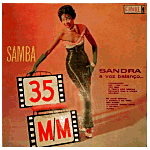 Sandra "Samba Em 35mm" (Pawal, 1960-?)
Sandra "Samba Em 35mm" (Pawal, 1960-?)
A swinging, brassy set from 1950s cabaret singer Sandra, who was a regular performer at the Drink nightclub... There's not much information about her online: apparently she died in an auto accident not long after winning a music award for up-and-coming new artists. Her talent is borne out on this record where she sparkles with confidence and ease; the arrangements are pretty static, but her vocals were nice. Presumably this was her only album, although she sang on a few tracks on the "Isto E O Drink" album, a showcase for the Drink artists, anchored by bandleader Celso Murillo.
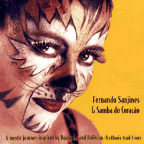 Fernando Sanjines & Samba Do Coracao "Heartbeat Of The Jaguar" (Coracao Records, 1999)
Fernando Sanjines & Samba Do Coracao "Heartbeat Of The Jaguar" (Coracao Records, 1999)
Samba do Coracao is one of San Francisco, California's best samba schools, and this album features plenty of dynamic, idiosyncratically original compositions by master drummer Sanjines, as well as sharp precision playing by both large and small ensembles. There are several tracks with unusual meters and stop-and-start rhythms; although their live performances are stunning, this album captures the power of their playing with surprising immediacy. Although San Fran had several samba schools in the 1970s and '80s, most never recorded their work, so this is a nice document of a scene which has been going strong for a while now. Well worth checking out!
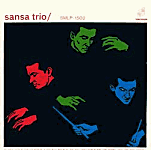 Sansa Trio "Sansa Trio" (Som Maior, 1965)
Sansa Trio "Sansa Trio" (Som Maior, 1965)
The first lineup of pianist Jose Briamonte's short-lived jazz trio, with backing by Benedito Pereira Dos Santos and Severino Gomes Da Silva on trumpet and Magno D’Alcantara, trombone. The lineup changed (spectacularly!) for their next album...
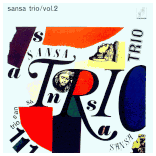 Sansa Trio "Sansa Trio, v.2" (Som Maior, 1966)
Sansa Trio "Sansa Trio, v.2" (Som Maior, 1966)
A swinging bossa-jazz trio set, showcasing the brisk, bright piano of Jose Briamonte, along with a new line-up of Airto Moreira on drums, and Jose Ordonez on bass. A lively, cheerful record, with a relatively unhurried feel, compared to many of their bossa trio contemporaries.
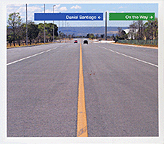 Daniel Santiago "On The Way" (Adventure Music/Brasilianos, 2006)
Daniel Santiago "On The Way" (Adventure Music/Brasilianos, 2006)
Splashy acoustic guitar jazz, with a heavy nod to the fusion-isms of the past. The trio behind this set of all-original material is plays at a lightning-fast clip, but with great delicacy, recalling old stuff by Milton Nascimento and his "Clube De Esquina" crowd, as well as classic fusioneers of the Return To Forever/LA Express/Spyro Gyra era. Again, it's not really my cup of tea, but there is an elegance and authority to this record that will make fans of jazz and new acoustic music sit up and take notice. It's a very accomplished album for the genre.
Daniel Santiago "Metropole" (Adventure Music, 2009)
(Produced by Daniel Santiago & Marcos Portinari)
Noodly jazz; not my cup of tea. All the tunes were composed by Santiago.
Emilio Santiago - see artist discography
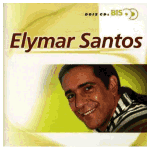 Elymar Santos "Serie Bis" (EMI, 2000)
Elymar Santos "Serie Bis" (EMI, 2000)
Super-cheesy "brega" pop vocals... A 2-CD set of this pop crooner, mainly slushy keyboard arrangements with occasional glimmers of samba or more vigorous MPB stylings, such as "Se Queres Saber," a decent duet with Nana Caymmi. Mostly, though, this collection is easily skipped -- no big loss.
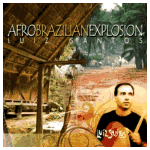 Luiz Santos "Afro Brazilian Explosion" (2009)
Luiz Santos "Afro Brazilian Explosion" (2009)
An unusual mix of free jazz, fusion and Brazilian regional styles, with plenty of odd time signatures from drummer Luiz Santos. If the guys in LA Express had been dropping acid in a Sao Paulo studio in the '70s, it might have wound up something like this. If you're into "difficult music," this could be a record you'd want on your radar.
Lulu Santos - see artist discography
Moacir Santos "Opus No. 3" (Discovery, 1968) (LP)
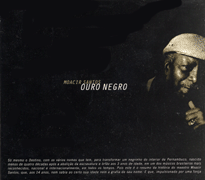 Moacir Santos "Ouro Negro" (Universal/Petrobras, 2001) (Adventure Music-US, 2004)
Moacir Santos "Ouro Negro" (Universal/Petrobras, 2001) (Adventure Music-US, 2004)
An overview, of sorts, of Brazilian jazz composer and saxophonist Moacir Santos, who emigrated to the United States in the late 1960s, where he recorded prolifically, mostly as a session player. This isn't exactly a best-of, but rather a sleek, double CD set of rerecorded versions of songs originally recorded in the 1960s and '70s, on albums such as Coisas (Forma, 1965), Maestro (Blue Note, 1972), Saudade (Blue Note, 1974), and Carnival Of Spirits (Blue Note, 1975). On these new versions, Santos guides a band that is joined by plenty of heavyweight Brazilian guest stars, including Milton Nascimento, Joyce, Gilberto Gil, Joao Bosco, Ed Motta, Joao Donato and Djavan. For the most part, it's actually the kind of jazz I hate -- simultaneously noodly and aggressive, though competently produced and pretty lively. Jazz fans should find this set pretty absorbing.
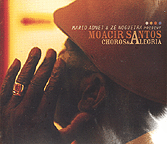 Moacir Santos "Choros & Alegria" (Adventure Music, 2005)
Moacir Santos "Choros & Alegria" (Adventure Music, 2005)
Veteran Brazilian jazzman Moacir Santos doesn't actually perform on this album, but he lent his approval as the original arranger and composer of all these songs, which are culled from a wide swath of his decades-long career... Guitarist Mario Adnet and saxophonist Ze Nogueira produced this disc as a followup to the album Ouro Negro, which also featured rearranged, newly recorded versions of numerous Santos jazz classics... Like that album, this is largely a straight jazz set, although this time around the songs are much mellower and less driving; the "smooth jazz" crowd should love this one. Santos explored some of the musical themes of the choro style -- sort of a Dixielandish, pre-jazz style from Brazil -- but does some interesting things to the music, slowing down the normally lightning-fast, slam-bang style to a relative crawl, allowing more room to explore the musical nuances and make the rich harmonic textures more apparent. This is a little too sweet and mellow for me, but if you use this album as a musical counterpoint to classic choro recordings from Pixinguinha and other masters of the genre, you may find it to be a very rewarding album.
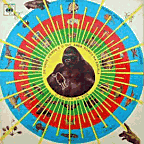 Pedro Santos "Krishnanda" (CBS, 1968) (LP)
Pedro Santos "Krishnanda" (CBS, 1968) (LP)
(Produced by Helicio Milito)
Psychedelic tribal jazz from Brazil... and a bit of syrupy kitsch, too. The weirder, more experimental stuff is pretty groovy, like the album opener, "Ritual Negro," which has a driving, thumb-piano sound not unlike the Zimbabwean chimurenga of the 1980s and '90s, interlaced with a solid, punchy jazz horn arrangement; other songs have film score-style strings, and numerous Brazilian and African traditional motifs. In some parts this lapses into Martin Denny-esque exotica-kitsch, but many tracks are quite challenging and bizarre. Fans of Rogerio Duprat's erudite tropicalia arrangements will definitely dig this disc, too. Worth poking around for. (British celebrity DJ crate-digger Gilles Peterson has collected a couple of Pedro Santos tracks on one of his "Brazilika" compilations: the tweaky "Quem Sou Eu" and "Esta Tudo Ai" from a different album...)
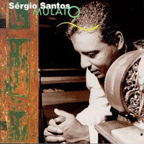 Sergio Santos "Eu E A Musica" (Blue Jackel, 1998)
Sergio Santos "Eu E A Musica" (Blue Jackel, 1998)
A solidly-produced melodic album, with bits of acoustic balladry, bits of samba, bits of jazz. Depending on your temperament, this may hit you as too fluffy and yuppified, or it may seem absolutely lovely. Skirts the edges of lite-jazz overproduction, and comes out rather nicely. Worth checking out.
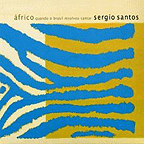 Sergio Santos "Africo: Quando O Brasil Resolveu Cantar" (Biscoito Fino, 2002)
Sergio Santos "Africo: Quando O Brasil Resolveu Cantar" (Biscoito Fino, 2002)
The first half of this disc has several dreamily complex, easily melodic tunes, with gently interlocking, African-tinged song structures similar to his earlier album, Eu E A Musica. The second half slides into a slick soft-jazz mode that I don't much care for, particularly when the soprano and alto saxophones become too prominent. But fans of Milton Nascimento and of more ornate, jazz-colored MPB will probably enjoy this quite a bit... For folks more on the "world music" tip, the first few songs are quite lovely.
Sergio Santos "Sergio Santos" (Biscoito Fino, 2004)
Sonia Santos "Sonia Santos" (Som Livre, 1975) (LP)
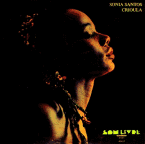 Sonia Santos "Crioula" (Som Livre, 1977) (LP)
Sonia Santos "Crioula" (Som Livre, 1977) (LP)
Lively MPB songs, sung in a variety of styles -- jazzy, funky, soulful, syrupy, sambadelic -- but unfortunately by a singer whose voice I'm not particularly fond of... It's a bit like hearing a Brazilian version of Shirley Bassey or Eartha Kitt: there's just some little thing there that bugs me. A more positive slant on this might be that she retains some of the rough edge that the earthier singers in the down-home rodas de samba of the morros, and indeed there were a couple of straight samba songs ("Joao Ningeum" and "Afinal Eu Encontrei") that I liked... But even so, some listeners may also find this a little grating. Tons of top talent and high-power session players backing her up -- the musical end is definitely what keeps it going.
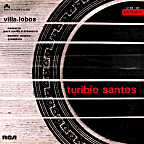 Turibio Santos "Villa Lobos: Sexteto Mistico/Preludios" (RCA/MIS, 1971) (LP)
Turibio Santos "Villa Lobos: Sexteto Mistico/Preludios" (RCA/MIS, 1971) (LP)
Exquisite acoustic guitar work, with classical virtuoso Turibio Santos exploring the work of Heitor Villa-Lobos, leading a full orchestra (the Orquestra de Camara Jean-Francois Paillard) on Side One of the album, while Side Two is taken up with several solo pieces that are simply staggering. The orchestral work -- Villa-Lobos' "Sexteto Mistico" -- is too florid and swooping for my tastes, but the solo performances are delicious. Santos never falters as he works his way through the complexities and idiosyncrasies of Villa-Lobos' work, and never loses sight of the beauty of each piece. Nice stuff.
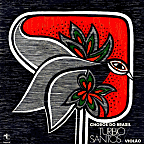 Turibio Santos "Choros Do Brasil" (Tapecar, 1977) (LP)
Turibio Santos "Choros Do Brasil" (Tapecar, 1977) (LP)
A gorgeous set of guitar instrumentals, exploring the choro genre from a gentle, contemplative angle. Included are works by Agustin Barrios, Dilermando Reis, Garoto, Joao Pernambuco, and others -- all of them dripping with beauty under Santos's skillful, soulful musicianship. Apparently Rafael Rabello is one of the accompanists on this album... Lovely stuff, highly recommended.
Turibio Santos "Grandes Sucessos Do Violao Latino-Americano" (Kuarup, 1982) (LP)
Turibio Santos "Villa-Violao: Obra Completa Para Violao Solo" (Kuarup, 19--?)
Vittor Santos "Trombone" (1994)
Vittor Santos "Sem Compromisso" (1996)
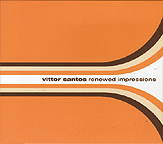 Vittor Santos "Renewed Impressions/Renovando As Consideracoes" (Adventure Music, 2006)
Vittor Santos "Renewed Impressions/Renovando As Consideracoes" (Adventure Music, 2006)
Mellow modern jazz from veteran trombonist Vittor Santos, along with some of the younger faces on the Brazilian jazz scene. Philipe Baden Powell plays piano throughout, and mandolinist Hamilton De Holanda join Santos' established band. It's too reserved and dewey for me, though informed jazz aficinados might have a better appreciation for this music than I do.
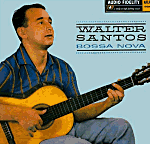 Walter Santos "Bossa Nova" (Audio Fidelity, 1963) (LP)
Walter Santos "Bossa Nova" (Audio Fidelity, 1963) (LP)
The first album from singer Walter Santos Sousa (1939-2008) who was a compatriot of bossa nova's founder, Joao Gilberto. Santos and Gilberto co-founded the group Os Enamorados do Ritmo, and here Santos follows Gilberto's lead, singing gentle, whimsical songs with a perky little lilt to them. Like many early bossa enthusiasts, Santos can hardly match the elegance and subtlety of Gilberto's original recordings -- but what he lacks in rhythmic and harmonic nuance, Santos makes up for in pep and good cheer. Of special note here is the accompaniment by organist Walter Wanderley, whose goofy, upbeat sensibility permeates the whole record. All in all, a fine, cheerful album with a nice nostalgic feel. Also worth noting: Santos founded the influential record company Som Da Gente, along with his wife, bossa nova artist Teresa Souza -- he was also the father of singer Luciana Souza, who started her recording career in the early 1990s.
Walter Santos "O Som Brasileiro Do Bamerindus" (Som Da Gente, 1981) (LP)
Lucas Santtana - see artist discography
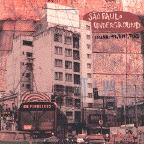 Sao Paulo Underground "Sauna: Um, Dois, Tres" (Submarine/Aesthetics, 2006)
Sao Paulo Underground "Sauna: Um, Dois, Tres" (Submarine/Aesthetics, 2006)
A very unusual album from Brazil, an avant garde noise-rock/experimental/electronic set that has more in common with Calexico, Sonic Youth or Zoviet France than with Caetano Veloso. The "Brazilianness" of the album isn't readily apparent until well into the middle when, on "Olhosss" they tip their hat with some regional sounds are mixed into a dense, intense, relaxed mix. That track is really cool, though for most "world music" listeners, this disc may be a little too weird and murky... But for avant and difficult music fans, hearing stuff like this coming out of Sao Paulo may be a real revelation. (Check out the US label's website at www.aesthetics-usa.com for more info...)
Sao Paulo Underground "The Principle Of Intrusive Relationships" (Aesthetics, 2008)
Sapoty Da Mangueira "Nega Atrevida" (Polydor, 1975) (LP)
Saraiva "Sobre O Ritmo Das Ondas " (Copacabana, 1964) (LP)
Elegant performances highlighting the work of the clarinetist known as Saraiva, sort of a stubborn holdout for the then-neglected choro genre. He's hardly a traditionalist, though -- these poppy instrumentals are in sort of a halfway zone between old-fashioned choro and the bouncy jazz-dance style called gafieria, with a bit of northeastern baiao thrown into the mix as well, and some creative, unusual melodies. This set is mostly lightly orchestrated, with solos traded by the clarinet and accordion... Didn't totally wow me, but it grew on me, for sure... Definitely worth a spin.
Saraiva "Sucesso Em Alta Tensao" (Copacabana, 1968) (LP)
Super-kitschy jazz/baiao/choro/easy listening instrumentals from the clarinetist called Saraiva (presumably Luis dos Santos, listed in nearly all the songwriting credits...) This is too pop and too corny and too lounge-y for me, couldn't hang with it, except maybe on a tune or two.
Chico Saraiva "Tregua" (Biscoito Fino, 2004)
Chico Saraiva "Saraivada" (Biscoito Fino, 2007)
Chico Saraiva & Veronica Ferriani "Sobre Palavras" (Boranda, 2009)
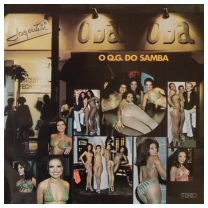 Sargentelli "Oba Oba O Q.G. Do Samba" (Continental, 1975) (LP)
Sargentelli "Oba Oba O Q.G. Do Samba" (Continental, 1975) (LP)
(Produced by Ramalho Neto & Luiz De Franca)
This souvenir album of the Oba Oba nightclub features decent (if blandly produced) '70s-style samba numbers with vocals by Abilio Martins, Juracy, and an unidentified chorus, possibly drawn from the gals who worked at the club. Speaking of which, these women are very much on display in the album art, which features some pretty sleazy T&A photos of the dancers in their skimpy outfits and six-inch high pumps which certainly helped accentuate the features that Sargentelli wanted accentuated. Anyway, musically this is perfectly fine, although there is better '70s samba to be found.
 Sargentelli "Oba! Oba! Sargentelli" (Continental, 1977) (LP)
Sargentelli "Oba! Oba! Sargentelli" (Continental, 1977) (LP)
(Produced by Ramalho Neto)
A number of notable samba and MPB singers join nightclub owner, TV personality and sometimes-bandleader Osvaldo Sargentelli, owner of the Oba Oba and other clubs in the late 1960s and '70s. Dicro, Sonia Lemos, Atualfo Jr., Gilson De Souza and Pedrinho Rodrigues all make guest appearances, while guitarist Ze Menezes anchors a solid pagode-style roots-raiz samba band. It's pretty darn good. I'm just guessing, but it seems likely many of these singers were artists whose careers Simonetti either championed or managed... anyone know for sure? At any rate, this is a nice record, definitely worth checking out.
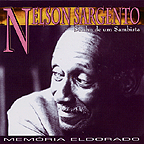 Nelson Sargento "Memoria Eldorado: Sonho De Um Sambista" (Eldorado, 1979) (LP)
Nelson Sargento "Memoria Eldorado: Sonho De Um Sambista" (Eldorado, 1979) (LP)
(Produced by J. C. Botezeli)
A beautiful album of old-school acoustic sambas, from velha guarda legend, Nelson Sargento. This is one of very few records he recorded as a solo artist (he's more frequently heard as a member of various ensembles or on Carnaval tributes and potpourri albums). This is lovely stuff, with Sargento calmly crooning atop a bright, glorious chorus and beautiful guitar work, and of course, the swish-swish of a delicately strummed cavaquinho. Recommended -- if you can find a copy, snap it up!
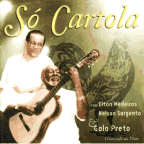 Nelson Sargento/Elton Medeiros/Galo Preto "So Cartola" (Rob Digital, 1999)
Nelson Sargento/Elton Medeiros/Galo Preto "So Cartola" (Rob Digital, 1999)
A live tribute album featuring some of the '70s acoustic sambistas who had worked with Cartola, and who co-wrote several of these songs. It's a sweet performance which takes a little while to gather steam. Initially things are a bit slow -- none of these fellers are as sprightly as they used to be, and the vocals are a bit slurred. But the band is solid, and Sargento's performance gains resonance as the show goes on. Nice stuff.
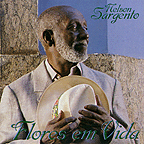 Nelson Sargento "Flores Em Vida" (Selos Radio MEC/Discos Rob, 2002)
Nelson Sargento "Flores Em Vida" (Selos Radio MEC/Discos Rob, 2002)
(Produced and arranged by Joao De Aquino)
A slight mismatch between Sargento's elegant, understated acoustic approach and the lush, jazz-tinged MPB arrangements that are draped atop many of these songs. I love the sound of his voice and guitar, but the saxophone, drippy piano work and brass that is added into the mix all seem needlessly intrusive. I mean, I guess it's okay, but it seems pretty syrupy to me. worth checking out, although his more down-to-earth stuff is better.
 Nelson Sargento "80 Anos" (Discos Rob, 2005)
Nelson Sargento "80 Anos" (Discos Rob, 2005)
A 4-CD box set... yummy!
 Almir Sater "Almir Sater" (Continental, 1981) (LP)
Almir Sater "Almir Sater" (Continental, 1981) (LP)
A native of Mato Grosso de Sul, guitarist Almir Sater is known as a major proponent of the caipira style, and an important regional artist... This is his debut album, a lively mix of acoustic styles, embracing singer-songwriter-y, non-Brazilian folk along various regional Brazilian and Latin American styles... He hints Mexican corridos as well as forroand baiao, consistently leaning on his restless guitar work, and impassioned, yearning vocals. It's pretty cool... well worth checking out!
 Almir Sater "Rasta Bonito" (Continental, 1989)
Almir Sater "Rasta Bonito" (Continental, 1989)
Brazilian bluegrass? Well, yeah, kinda! This is a super-cool record in which Sater explores North American country music, with surprising depth and vigor. The title track opens the album, bursting with a Johnny Cash-styled chugga-chugga rhythm, and while Sater sings in Portuguese, a mandolin and guitar break that could have come off a Bill Monroe album floats up to the surface. A couple of tunes later, he plays a straight-up bluegrass instrumental, "Capim Azul," where Sater whips off some sweet flatpicking guitar licks, stuff that would have made Chet Atkins blush with pride. He laces the rest of the record with country touches, skillfully mixing them in with the Brazilian folk/pop that he's known for. Just to hammer things home, he also sings an English language version of "The Tennessee Waltz," a surprisingly effective version, even with the Brazilian accent. I was totally wowed by this record; there's very little like it to be heard in Brazilian popular music, and Sater really nailed it. Recommended!
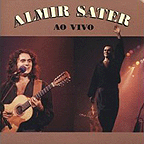 Almir Sater "Ao Vivo" (Columbia Records, 1992)
Almir Sater "Ao Vivo" (Columbia Records, 1992)
This disc captures him in an affectionately-received live performance; I have to confess, however, that although I found this disc inoffensive and delicate at times, I also felt like I just didn't "get" it for the most part. I think there's more history here than I know about, and I'll have to check our some of his earlier albums before I can really form an opinion. Offhand, though, this didn't totally wow me.
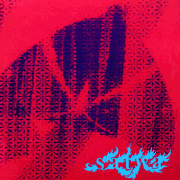 Satwa "Satwa" (Rosemblit, 1973) (LP)
Satwa "Satwa" (Rosemblit, 1973) (LP)
A groovy psychedelic curio from hippie-era Brazil... This noodly, mostly-all-acoustic, mostly-all-instrumental album has a folk-freak feel that could as easily have been recorded in upstate New York or in a yurt in Southern California... It's basically a long, spaced out jam session between two stringed instruments, a folkie 12-string and a zither-like sitar, producing faerie-like riffs that just go on and on. It's broken into ten separate tracks, but they all sound the same, as if the musicians -- the post-tropicalia duo of Lula Cortes and Lailson -- were, y'know, like, really, really high and, like, really, really digging the groove, man, and exploring it as far as it would go. Like, totally. Tudo azul, meu dude. One track on Side Two features Robertinho Do Recife on electric guitar along with some spacey, half-hummed vocals, but the mood remains the same, and they quickly revert to pure acoustic music for the last two tracks. The thing of it is, though, it's a really pretty, narcotically pleasant album. It's odd, it's indulgent, it was a totally kooky project, but it holds up really well, decades later. Do you dig Davendra Banhart? Then check these guys out, too. You'll be psyched.
Breno Sauer "Viva O Samba" (Columbia, 19--?) (LP)
Claudia Savaget "Impacto" (Studio Hara, 1974) (LP)
A secondary figure on the 1970's MPB scene, vocalist Claudia Savaget apparently recorded only five albums over her career (anyone know for sure if this is true...? and maybe what the name of the fourth one was, and when it came out?) As you can tell, it's hard to track down any info about her, though I see her name popping up in a lot of '70s session work, with artists like Oswaldo Montenegro and other random folk. Not sure where she came from or how popular she was, but this disc was her first record, and it took me about an hour's worth of Googling just to find out its title. I'd be curious to check it out sometime.
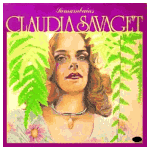 Claudia Savaget "Samambaias" (Tapecar, 1978) (LP)
Claudia Savaget "Samambaias" (Tapecar, 1978) (LP)
(Produced by Herminio Bello de Carvalho & Mauricio Tapajos)
Classic 1970s MPB, with swank, half-orchestral/half-jazz/all-bossa arrangements and solid musicianship throughout. Arrangers Dori Caymmi and Cesar Camargo Mariano split the repertoire evenly, with Camargo Mariano's perhaps more strongly defining the album. Savaget's vocals are solid as well, at first perhaps a bit jarring, but you'll grow to like them... If, perhaps, you've enjoyed the musical side of Maria Bethania's work, but find her voice taxing at times, you'll probably love this record. She may not have garnered much fame, but Savaget was definitely in the swing of things! Recommended.
Claudia Savaget "Mordida Ou Beijo" (Tapecar, 1979) (LP)
 Claudia Savaget/Various Artists "Caminhando" (UMES-Brasil, 2004)
Claudia Savaget/Various Artists "Caminhando" (UMES-Brasil, 2004)
A stately set of samba classics, including standards by Cartola, Nelson Cavaquinho, Noel Rosa and more modern material by Chico Buarque, Guinga and others. Just the kind of lush, stately acoustic samba I love, with strumming bandolim and cavaquinho, along with sweet, restrained orchestrations. Savaget's voice is older and nicely mature, very subtle and soulful. Definitely worth a spin!
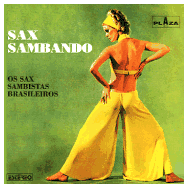 Os Saxsambistas Brasileiros "Sax Sambando" (Plaza, 1960) (LP)
Os Saxsambistas Brasileiros "Sax Sambando" (Plaza, 1960) (LP)
(Produced by Henrique Gandelman)
A fun, perky set of easy listening instrumentals, apparently led by fabled session saxophonist Moacyr Silva working anonymously -- for whatever reason -- as part of this made-up studio band. Includes covers of many bossa nova hits and samba-cancao classics such as "Teleco-Teco #2," "Desafinado," "Meditacao," and "Chega De Saudade." The hasty production style actually gives this album a distinctive sound -- it's a little bouncier and less languid than a many Brazilian lounge albums of the 1950s and '60s. In addition to the horn arrangements, this album prominently spotlights the guitar-vibrophone pairing of Waltel Branco and Tião Marinho, a technique echoed on Branco's albums of the same era. Apparently batucada percussionist Milton ("Mestre") Marcal is also part of this band, at least on this album. Fun, lightweight stuff! (Note: this was reissued on the Tropicana label as Rosa Moreno, under the name of "Bil Bell," an additional pseudonym for an anonymous band!)
Os Saxsambistas Brasileiros "Percussao Em Festa" (Plaza)
Reissued in North America on the Epic label as Carnival Fantastico, below...
Os Saxsambistas Brasileiros "Bossa Nova Espetacular" (Plaza, 19--?)
Os Saxsambistas Brasileiros "Carnival Fantastico" (Epic)
I'm afraid I don't know who the musicians were on this hastily-produced '60s-era album -- I suspect there were more than a few top-flight Brazilian jazz players involved, uncredited in the handful of albums released under this band's name. At any rate, this is cute, enjoyable stuff -- latter-day choro-influenced instrumentals, including covers of oldies such as "Tico Tico No Fuba," "Aquarela Do Brasil" and "South American Way," as well as newer bossa nova material like "A Felicidade." It's enjoyable, and not the super-cheesy easy-listening you might expect.
Beto Scala "Beto Scala" (RGE, 1976) (LP)
Beto Scala "Arrepia My Brother" (Alif Arts, 1995)
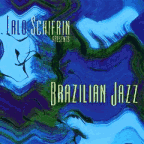 Lalo Schifrin "Brazilian Jazz" (Aleph, 2000)
Lalo Schifrin "Brazilian Jazz" (Aleph, 2000)
Argentinian jazz pianist Lalo Schifrin goes bossa-delic on this zippy little album, originally recorded in 1962, with a few sidemen from Dizzy Gillespie's band, and a pair of Latin American percussionists in tow. Honestly, this has nowhere near the deftness or subtlety of the bossa nova albums it sought to emulate -- by comparison this sounds downright cluttered and rushed. It also doesn't exemplify the best of Schifrin's swingin' hipster sound -- it's a bit too hurried and perky. But it does stand up as a period piece, and it's certainly not unpleasant to the ears. Worth a spin!
Chico Science - see artist discography
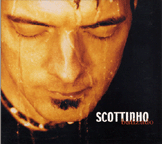 Scottinho "Batizado" (Homen De Ouro, 2003)
Scottinho "Batizado" (Homen De Ouro, 2003)
Although "Scottinho" is really a North American -- guitarist Scott Anderson, originally hailing from the American Midwest -- he still gets honorable mention for the thoroughness with which he has absorbed the Brazilian MPB-Jazz style. The first half of this disc is steeped in the sleek, cosmopolitan fusions of the Brazilian jazz giants of the 1970s and '80s, in particular Milton Nascimento and Toninho Horta, each of whom have a song on this album dedicated to them. If you don't like the slick, sometimes indulgent feel of that era of Brazilian jazz-fusion, then this might not be the right album for you; but if you do like the style, then Scottinho's mastery of it is impressive. He traveled to Brazil to record much of this album, even recording one tune with his idol, Toninho Horta. The album starts to drift apart midway, however, and loses the tight focus of the first few tracks. Anderson's decision to sing (and write) in English on a couple of songs turns out to be a distraction as well... But taken song by song, the initial half dozen tracks are quite noteworthy.
Secos & Molhados - see artist discography
Raul Seixas - see artist discography
Os Selvagens "Os Selvagens" (Caravelle, 19--?) (LP)
Os Selvagens "Os Selvagens" (Epic, 19--?) (LP)
Os Selvagens "Don't Leave Me Now" (Epic, 1971) (LP)
Os Selvagens "O Menino Da Porteira" (Epic, 1974) (LP)
(Produced by Rossini Pinto)
William Senna "O Homem Do Madeiro" (Carmo, 1985) (LP)
Guitar instrumentals, with sort of a John Fahey/Leo Kottke/Windham Hill "new acoustic" feel, and some slight processing on the sound mix. Good for the genre, though it didn't really stand out much for me...
Sepultura - see artist discography
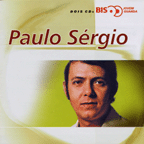 Paulo Sergio "Serie Bis - Jovem Guarda" (EMI, 2000)
Paulo Sergio "Serie Bis - Jovem Guarda" (EMI, 2000)
A well-chosen 2-CD set of material from this latter-day jovem guarda singer. Sergio was an unabashed imitator of JG superstar Roberto Carlos, but whereas TV host Carlos dipped liberally into romantic schmaltz, Sergio seemed to prefer more upbeat material, with the organ-guitar combo that made some of Carlos's rock-oriented work sound so fun. This collection spans 1972-83, with material from the Copacabana label that is surprisingly consistent and listenable. I mean, it's not the greatest Brazilian rock music ever, but it sure ain't the worst. Even the later tracks, which are predictably softer and slicker, are still pretty decent... There's very little on here that'd actually make you cringe, and plenty of songs that are fun enough, in a kitschy, retro way. It also includes his biggest hit, "Ultimo Cancao," from 1969.
Paulo Sergio "Selecao De Ouro" (EMI, 1998)
Paulo Sergio "Paulo Sergio 1" (Caravelle, 1968)
Paulo Sergio "Paulo Sergio 2" (Caravelle, 1968)
Paulo Sergio "Paulo Sergio 3" (Caravelle, 1969)
Paulo Sergio "Paulo Sergio 4" (Caravelle, 1970)
Paulo Sergio "Paulo Sergio 5" (Caravelle, 1971)
Bola Sete - see artist discography
Seu Jorge - see artist discography
 Severino Filho "Viva Sao Jorge" (Columbia, 1956) (LP)
Severino Filho "Viva Sao Jorge" (Columbia, 1956) (LP)
A curious album from Severino Filho of the vocal group Os Cariocas, here leading a perky orchestra and chirpy vocal chorus in a tribute to the dragon-slaying Sao Jorge (Saint George) the patron saint of Rio de Janeiro. What's odd is that Sao Jorge is also a "lua," an important figure in Brazilian candomble, or Orixa, the syncretic religion that blends west African animism with Spanish Catholicism. The confluence of this underground spirituality and the Brazil's mainstream record industry is a fascinating phenomenon, and this album is a fine example: several songs, such as "Salve Ogum" and "Ogum Sao Jorge" are unquestionably Orixa songs, and yet the perky, samba-tinged big band arrangements seem miles away from the percussion-heavy performances usually associated with Orixa music. Maybe more of a curio for devotees of candomble, but fun nonetheless.
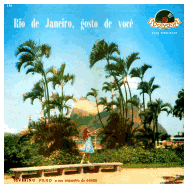 Severino Filho "Rio De Janeiro, Gosto De Voce" (Polydor, 1958) (LP)
Severino Filho "Rio De Janeiro, Gosto De Voce" (Polydor, 1958) (LP)
A solo album, of sorts, by Severino Filho, leader of the vocal group Os Cariocas. The ensemble sings on a couple of tracks, but this is mostly an instrumental outing, with big-bandy versions of samba-cancao standards. Some of the arrangements are a little too kitschy, especially the parts with the vibraphone as lead. But there are also some serious gafieira musicians playing on here as well -- not sure who they were, since there are no credits, but some of the solos are hot. Overall, though, this isn't the most vigorous Brazilian orchestral albums, but it's okay for a nostalgia kick.
 Severino Filho "Metais E Vozes Em Festival" (Polydor)
Severino Filho "Metais E Vozes Em Festival" (Polydor)
 Severino Filho "The Orchestra Of Severino Filho: Recordings 1958" (Black Round Records, 2009)
Severino Filho "The Orchestra Of Severino Filho: Recordings 1958" (Black Round Records, 2009)
This digital-only release is a straight-up reissue of the 1958 Rio de Janeiro album listed above, mysteriously given a different, vaguer title. Same groovy music, though.
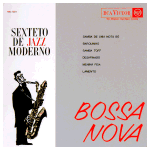 Sexteto De Jazz Moderno "Bossa Nova" (RCA Victor, 1963) (LP)
Sexteto De Jazz Moderno "Bossa Nova" (RCA Victor, 1963) (LP)
An unusually sharp jazz set from Brazil -- half-cool, half bebop -- featuring excellent saxophone work by alto Jorginho and tenor Aurino, guitar by fabled session player Jose ("Ze") Menezes and piano from Fats Elpidio. The songs are mostly standards such as "One Note Samba," given room to breathe in longer jam sessions (with actual improv) and are a pleasant break from the fast, aggressive style of the bossa trios of the time. Definitely worth checking out.
Sexteto Guanabara "Sorvete Dancante, v.2" (Musiplay, 1963) (LP)
One of several albums released by this lamentably anonymous band... Apparently bossa-jazz star Oscar Castro Neves was credited as producer on this album; it's possible he played on it as well.
Bud Shank - see Bossa Nova Jazz
George Shearing "Bossa Nova" (Capitol Records, 1963) (LP)
(Produced by Tom Morgan)
A breezy, easy all-instrumental set, with pianist George Shearing having fun with a number of bossa classics -- as well as a few originals from Laurindo Almeida -- set to tight, pixielike arrangements from Clare Fischer, and an unidentified studio band. This is pretty light fare but no more so than countless albums coming out of Brazil at the time. This stacks up just fine next to contemporary records from the likes of Antonio Carlos Jobim, Manfredo Fest, et. al. If you like easy listening, this is quality material. Other than bassist Ralph Pena, and possibly Laurindo Almeida, the backing musicians aren't identified, alas.
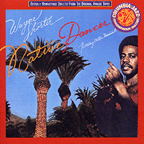 Wayne Shorter "Native Dancer" (Columbia Records, 1975) (LP)
Wayne Shorter "Native Dancer" (Columbia Records, 1975) (LP)
A fairly solid commercial jazz album, from the height of the fusion days, this is the first of many collaborations between soprano sax player Shorter and the dreamy-spacey Milton Nascimento. This album had a profound impact on the '70s jazz scene, introducing a more modern, non-bossa nova Brazilian sound into the experimentation of the time. Nascimento performs on and contributes several songs, and although Shorter takes some interesting chances with the material (particularly on the melodically-deflated version of "Lilia"), ultimately he seems to have lacked the compositional strength that would have made this a truly great album. As it is, it's a little goopy, and many of the songs lack true resonance.
Siba E A Fuloresta "Fuloresta Do Samba" (Terreiro, 2002)
 Siba E A Fuloresta "Toda Fez Que Eu Dou Um Passo O Mundo Sai Do Lugar" (Outros Discos/Ambulante Discos, 2007)
Siba E A Fuloresta "Toda Fez Que Eu Dou Um Passo O Mundo Sai Do Lugar" (Outros Discos/Ambulante Discos, 2007)
A kooky, postmodernist set from this Pernambuco-based artist/band. A graduate of Mestre Ambrosio's samba school, Siba seems tapped into the whole neotropicalia scene that includes Moreno Veloso and his +1 comrades, with Beto Villares and vocalist Ceu adding ther voices to this record. What makes this album so distinctive is the use of the tuba as a lead instrument, laced with brass band accompaniment and crazy guitar-and-keyboard rock touches, underpinned by samba and marching tempos. Indeed, there's a crazy Brazil-meets-New Orleans feel that might make it hard to decide which festival to attend, Carnival or Mardis Gras... Not necessarily a record I'd want on for relaxation, but a cool, unusual mix of styles.
Siba E A Fuloresta "Canoa Furada" (2009)
Siba "Avante" (Mais Um Discos, 2013)
Wilsom Sideral "1" (Mercury, 1999)
A somewhat disappointing, funk-laced modern rock album from the tattoo-bearing younger set. Sideral has rock-star good looks, but not a rock-star great voice. On the plus side, most of his songs are original material, although on the whole the arrangements tend to be a bit cluttered. Some interesting rock music is percolating up in the mix, but there are still some rough patches.
Wilsom Sideral "Lancado Al Mar" (Universal, 2004)
Wilsom Sideral "Na Paz" (Universal, 2007)
Silva "Janeiro" (EP) (Six Degrees, 2014)
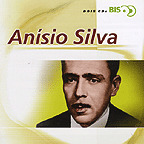 Anisio Silva "Serie Bis" (EMI, 2000)
Anisio Silva "Serie Bis" (EMI, 2000)
A nice 2-CD set gathering some of the finest Brazilian versions of the musical trends popular elsewhere on the continent, namely the tango and the lush, lachrymose bolero. Anisio Silva was a Sao Paulo native who signed to Odeon in the late 1950s, at the tail end of the pre-bossa nova "radio singers" era, and he specialized in grand, weepy, romantic songs, many of which he wrote, and some that were adapted from the work of Spanish-language composers such as Ernesto Lecuona. While the material is pretty slushy, you have to admit Silva had a really nice voice, and these tunes have a warm nostalgic charm. The production on these old recordings was clear and forthright, matching the declarative melodrama of Silva's vocals... This best-of collection ranges from his first hit from 1956, "Tudo Foi Ilusao," through material recorded as late as 1965, when he career had long since peaked. It's wonderfully corny music, some of the best of its kind. (Note: this collection is pretty much interchangable with the earlier Meus Momentos discs that came out in the 1990s... Both versions are out of print, but worth looking for...)
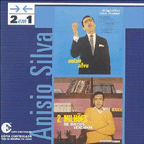 Anisio Silva "2-Em-1: Alguem Me Disse/Dois Milhoes De Discos Vendidos" (EMI, 2003)
Anisio Silva "2-Em-1: Alguem Me Disse/Dois Milhoes De Discos Vendidos" (EMI, 2003)
This twofer disc reissues a pair of Silva's later albums, Alguem Me Disse, from 1960, and Dois Milhoes De Discos Vendidos, a best-of LP that came out in '61. All of the hits on the second album, and some of the material from the first are included on the Serie Bis double CD listed above; either collection will give you a pretty full picture of Silva's career. It's pure corn, and kinda nice.
Anisio Silva "Alguem Me Disse" (EMI, 1960) (LP)
The full album is also available as its own CD... and it's pretty good! Pure corny romantic schmaltz -- solidly produced and easy on the ears. Recommended.
Carmen Silva "Disco De Ouro" (CBS, 1977) (LP)
I don't know much about this late-1970s singer, but this best-of LP wasn't too distinctive. She had a big old 'fro, but doesn't seem to have been much of a soul singer. There's one upbeat samba-rock number; the rest of the album is made up of fairly tepid MPB ballads. Anyone know more about her... and albums to suggest?
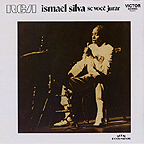 Ismael Silva "Se Voce Jurar" (RCA, 1973) (LP)
Ismael Silva "Se Voce Jurar" (RCA, 1973) (LP)
(Produced by Waldyr Santos)
An old-timer from the 1930s heyday of samba cancao, vocalist Ismael Silva (1905-1978) had been out of the public eye for a couple of decades when he recorded this warm, playful set, mostly made up of classic songs that he wrote or cowrote (along with artists such as Francisco Alves and Noel Rosa) back in the "radio singer" era. While revival albums like this often feature older artists who have a hard time summoning the power to match their early work, Ismael is in full command of this project. His voice is only slightly less supple than it once was, while his phrasing is confident and concise. Framed by modern acoustic pagode arrangements, and paired with a small female chorus, Silva knocks out one of the finer sets of old-school samba the '70s -- it's a really nice record. Recommended!
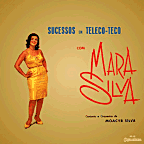 Mara Silva "Sucessos Em Teleco-Teco" (Copacabana, 1962) (LP)
Mara Silva "Sucessos Em Teleco-Teco" (Copacabana, 1962) (LP)
(Produced by Moacyr Silva)
A charming set of latter-day samba-cancao, with perky orchestral arrangements and a throaty female singer in the style of Dolores Duran and Elizeth Cardoso. This was apparently Mara Silva's only full-length album; I'm not sure what relation, if any, she was to bandleader Moacyr Silva, who backs her on these sessions. A nice bit of nostalgia -- not a stunning album, but pleasant and solidly produced.
Moacyr Silva "O Melhor Da Bossa" (Masterpiece, 1965) (LP)
Nerinho Silva "Nerinho Silva" (Beverly, 1974) (LP)
(Produced by Talmo Scaranari & Decio Fonsi)
Orlando Silva - see artist discography
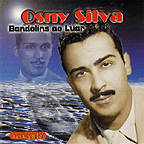 Osny Silva "Bandolins Ao Luar" (Revivendo)
Osny Silva "Bandolins Ao Luar" (Revivendo)
Remarkably corny pop vocals from the 1950s and early '60s, heavy on tangos and waltzes, and slow, syrupy vocals. Even for me, this is a bit much... Not, of course, to be confused with Orlando Silva, the great crooner whose heyday was a decade or two earlier.
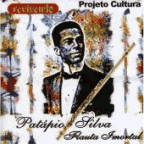 Patapio Silva "Flauta Imortal" (Revivendo, 1996)
Patapio Silva "Flauta Imortal" (Revivendo, 1996)
An international star at the turn of the Twentieth Century, Patapio Silva is the big granddaddy of modern Brazilian flautists... Benedito Lacerda, Altamiro Carrilho, all owe a stylistic debt to this showy, inventive player, whose nimble musicianship and puckishness radiate from these ancient recordings. Silva was one of the great popular composers of the Belle Epoque and began recording at the dawn of the Brazilian record industry. This disc includes all the recordings he made for the fledgling Odeon label in 1901(!) including classical tunes by Schubert and Chopin, various Brazilian composers, and nine of his own compositions, which have all passed down into the national repertoire. Silva was a true prodigy, a working-class kid who earned a spot in a prestigious musical academy and broke open social boundaries in Brazilian popular and classical music... Most of all, he was a dazzling performer and although these tracks are not formally considered choro music, fans of that style will want to check this album out: Silva's virtuoso runs are both rugged and masterful, soulful and technically dazzling. The recordings themselves are rough; you can barely hear the accompaniment of piano and other instruments, but really you don't need to... The heady, intoxicating flute is the main attraction, and this collection is pure gold. (Here's a link to the Revivendo label's website, for more info: www.revivendomusicas.com.br
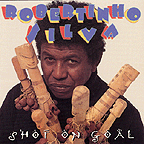 Robertinho Silva "Perigo De Goal (Shot On Goal)" (Fantasy-Milestone, 1995)
Robertinho Silva "Perigo De Goal (Shot On Goal)" (Fantasy-Milestone, 1995)
Although there's a wealth of "real" Brazilianness underlying this album, the soft, brisk jazz-lite feel is a turnoff for me. Still, it's a top-flight session for the Rio jazz scene. Most of this material was recorded in 1991, but released later up here in the States a few years later.
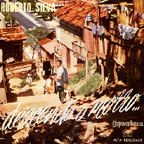 Roberto Silva "Descendo O Morro" (EMI/Copacabana, 1958) (LP)
Roberto Silva "Descendo O Morro" (EMI/Copacabana, 1958) (LP)
Bright, melodic acoustic sambas, with folkish, Belafonte-esque vocals -- very similar to Dorival Caymmi or Paulinho Da Viola, but less expressive vocally. Originally recorded in the late 1950s, these songs are wonderful, but the arrangements are rather static and monochromatic, and tend to blend together after a few tracks.
 Roberto Silva "Descendo O Morro, v. 2" (EMI/Copacabana, 1959) (LP)
Roberto Silva "Descendo O Morro, v. 2" (EMI/Copacabana, 1959) (LP)
More roots samba, recorded just as the bossa era was taking off, and the pop sounds of the 'Fifties were still holding on. Silva's sound has a traditionalist core, sometimes at odds with the stiff orchestrations, but overall it's evocative and deep. Worth checking out!
Roberto Silva "Descendo O Morro, v. 3" (EMI/Copacabana, 1960) (LP)
Another nice album... Silva's late-vintage samba cancao has a staid, almost folk-ish feel to it, similar to Dorival Caymmi's albums from the same era. The third Morro album is pretty much like the first two -- where you should sit up and take notice is on the fourth album, where perkier instrumentation kicks in, notably the sound of the plaintive cavaquinho. Moving away from chugga-chugga pop arrangements into a more acoustic sound, Silva paved the way for the pagode revolution of the early 1970s. Those 1961 recordings are really quite sweet.
Roberto Silva "Descendo O Morro, v. 4" (EMI/Copacabana, 1961) (LP)
Here's where you should sit up and take notice -- perkier instrumentation kicks in, notably the sound of the plaintive cavaquinho. Moving away from '50s-era chugga-chugga pop arrangements into a more acoustic sound, Silva paved the way for the pagode revolution of the early 1970s. These 1961 recordings are really quite sweet.
Roberto Silva "Roberto Silva" (EMI/Copacabana, 1964) (LP)
Coming out of the Descendo O Morro series, Silva delved even deeper onto the buoyant samba sound that would later become identified with '70s artists such as Alcione and Clara Nunes. [Note: T\this mid-'Sixties record was reissued on CD with the album below.]
Roberto Silva "Subindo O Morro" (EMI/Copacabana, 1965) (LP)
Roberto Silva "Volta Por Cima" (Universal, 2007)
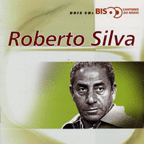 Roberto Silva "Serie Bis - Cantores Do Radio" (EMI/Copacabana, 2000)
Roberto Silva "Serie Bis - Cantores Do Radio" (EMI/Copacabana, 2000)
This tasty 2-CD set picks up where the Descendo O Morro series leaves off, with Silva developing the classic pagode sound, of catchy acoustic sambas, filled with ringing, melodic cavaquinhos and upbeat vocal choruses. Fans of Martinho da Vila's work will delight in Silva's pioneering early '60s recordings, although this collection also stretches into the mid-'70s, when pagode was at its full-scale peak. Nice collection -- recommended!
Roberto Silva "Raizes Do Samba" (EMI, 1999)
Roberto Silva "Eu Sou O Samba" (EMI, 2005)
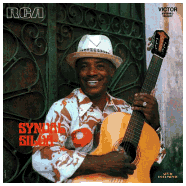 Synval Silva "Synval Silva" (EMI, 1973) (LP)
Synval Silva "Synval Silva" (EMI, 1973) (LP)
(Produced by Luiz De Franca; Arrangements by Nelsinho & Peruzzi)
A 1930's samba-cancao old-timer whose songs were recorded by Carmen Miranda and Cyro Monteiro, 61-year old Synval Silva (1911-1994) reemerged during the 1970's samba revival to record this lively, often whimsical album, which I believe was the only full LP of his career. His voice is in pretty fine shape, especially when compared to his velha guarda contemporaries such as Cartola, et.al. -- he still sounds supple and playful, and capable of keeping up with the somewhat busy, glitzy modern arrangements. The album is rooted in old samba rhythms, but given a 70s-style makeover, with hints of soul/disco and a Vegas-y big-band boost on top of the standard cavaquinho-and-chorus formula of the pagode scene. Parts of it feel a little overly-baroque, but overall, this disc is a delight, a strong effort from an old pro, and an interesting cross-generational re-realization of the old 1930s samba orchestrations. Recommended!
Ubirajara Silveira & Seus Ambaixadores De Copacabana "Solovox Do Ouro" (RGE, 1963) (LP)
Silvana "A Versatil" (Beverly, 1962) (LP)
Silvana "Internacional" (Copacabana, 1974) (LP)
Jussara Silveira "Jussara Silveira" (Dubas, 1997)
Jussara Silveira "Cancoes De Caymmi" (Dubas, 1998)
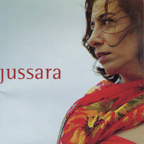 Jussara Silveira "Jussara" (Maianga, 2002)
Jussara Silveira "Jussara" (Maianga, 2002)
(Produced by Chico Neves & Mauricio Pacheco)
Mellow, soul-and electronica-tinged mangue beat alt-rock, recorded with producer Chico Neves, with assist from other younger, innovative artists such as Paulo Jobim, Lucas Santtana and bandolim wizard Armandinho... The approach is very similar to that of Ana Carolina or Marisa Monte, though not quite as commercial and bland as the one, nor as resonant and arresting as the other. All in all, though, this is quite nice. Definitely worth checking out!
Jussara Silveira & Luiz Brasil "Nobreza" (Maianga, 2006)
Jussara Silveira "Entre O Amor E O Mar" (Maianga, 2007)
Orlando Silveira & Carolina Cardoso De Menezes "Honeymoon In Rio" (Capitol, 1956) (LP)
Although this is a pretty kitschy, lightweight easy-pop album, with plunky piano and stolid percussion, I suspect there are a number of real talents lined up in the backing band, particularly when you hear the Sivuca-esque forro accordion and the Bola Sete-styled electric guitar. This is okay material from the pre-bossa nightclub era, but it didn't do that much for me.
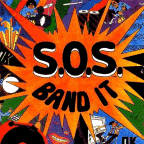 Orlando Silveira & SOS "Band It" (Parlophone, 1974) (LP)
Orlando Silveira & SOS "Band It" (Parlophone, 1974) (LP)
A kitschy disco-era novelty album, with instrumental numbers that range from jittery disco-funk to over-the-top cheesy-orchestral, along with some English-language vocal tunes. It's all very sound-libraryish and ripe for adulation by irony-addicted retro-ologists. Sorry, folks -- I just can't take music like this seriously, or spend the time to enjoy it as a joke. Apparently Orlando Silveira was a popular bandleader with a long career that stretched back into more traditional, substantive work than this... But his SOS ("Som Orlando Silveira") is really just a joke band, and can be treated as such.
Ricardo Silveira "Musician" (WEA, 1987)
A negligible set of soft-jazz instrumentals by this studio guitarist, who had done some work with Gilberto Gil, Milton Nascimento and others. Lifeless pop that could just as easily have been produced by David Sanborn or Kenny G.
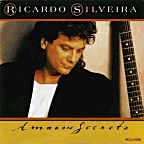 Ricardo Silveira "Amazon Secrets" (Polygram, 1990)
Ricardo Silveira "Amazon Secrets" (Polygram, 1990)
Ricardo Silveira "Noite Clara" (Adventure Music, 2003)
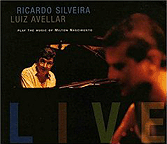 Ricardo Silveira & Luiz Avellar "Play The Music Of Milton Nascimento - Live" (Adventure Music, 2004)
Ricardo Silveira & Luiz Avellar "Play The Music Of Milton Nascimento - Live" (Adventure Music, 2004)
Verrrry, verrry mellow instrumental guitar and piano versions of ten classic Milton Nascimento compositions, including several of his more tuneful numbers, such as "Para Lennon E McCartney," "Cravo E Canela" and "Maria, Maria." This is EZ jazz to the Nth degree, not my cup of tea, although it does have the advantage that Nascimento himself isn't on the album, providing some measure of relief from the ululation and spaciness that has become his trademark. Also, it's an interesting take on this older, well-know material; Silveira and Avellar do give their own spin to many of these well-known tunes. Robertinho Silva adds percussion on several tunes.
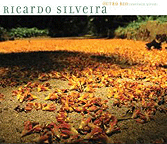 Ricardo Silveira "Outro Rio" (Adventure Music, 2007)
Ricardo Silveira "Outro Rio" (Adventure Music, 2007)
A very sweet, very mellow set of acoustic guitar instrumentals by Brazilian guitarist Ricardo Silveira, with light percussion-bass backup... The relatively sparse, low-key production i a real plus as far as I'm concerned -- the simpler, the better, and with the exception of a few tunes, Silveira keeps it pretty simple on here. Several guest appearances as well: Joao Donato adds some lovely, understated piano on "O Sol Na Janela," cellist Jaques Morelenbaum plays on "Moonlight In Rangiroa" and Maria Rita sings on "A Medida Do Meu Coracao." It's the trio work, with bassist Andres Rodrigues and drummer Renato Massa, that really stands out, though, and best highlights Silveira's strengths as a melodic composer. Folks who dig mellow, relaxing "smooth jazz" will definitely want to check this out... it's a very strong record for the style!
 Ricardo Silveira & Roberto Taufic "Atlanticos" (Adventure Music, 2013)
Ricardo Silveira & Roberto Taufic "Atlanticos" (Adventure Music, 2013)
Super-mellow acoustic guitar duets... A little too noodly for me, and not particularly "Brazilian," but very easy on the ears.
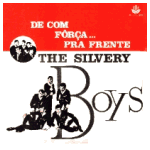 The Silvery Boys "De Com Forca... Pra Frente" (RGE, 1967) (LP)
The Silvery Boys "De Com Forca... Pra Frente" (RGE, 1967) (LP)
I first saw this band listed as part of a series of cheapo "samba-rock" collections -- a style that I like, but those particular comps were so cheesy-looking I just couldn't bring myself to pick them up. So I can't tell you (yet) it the Silvery Boys' samba-rock bona fides are based on these 'Sixties tracks, or on later, funkier stuff. Regardless, these guys had dynamism and a solid groove... You can certainly hear the seeds of any future funkiness in these frat-rockish Summer of Love recordings, which rely on a bouncy backbeat and lots of horn riffs and organ fills. For the Brazilian jovem guarda scene, this was pretty tight, although admittedly still a little goofy. Definitely worth a spin.
The Silvery Boys "The Silvery Boys" (RGE, 1968) (LP)
Silvinha - see artist discography
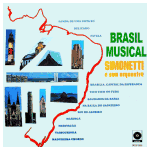 Simonetti & Orquestra RGE "Brasil Musical" (RGE, 1960) (LP)
Simonetti & Orquestra RGE "Brasil Musical" (RGE, 1960) (LP)
Posh, tony, over-the-top orchestral dance versions of old samba-cancao classics, with sort of an overwrought MGM musical vibe, courtesy of Italian expatriate bandleader Enrico Simonetti, who ran the RGE house band for a few years in the late '50s/early '60s... There are traditional instruments mixed in -- a snippet of cavaquinho, etc. -- but mostly it's big brass and strings. Best on the uptempo tunes, such as Ary Barroso's "Rio De Janeiro"; the slow songs are kinda sappy. Too corny for me, with little of the big bandish tones of the gafieria orchestras of the same era. But if you're into "lounge music," this might be kinda fun. I did enjoy the buoyancy of "Brasilia A Capital Da Esperanca," a Mancini-flavored tune that's one of the highlight tracks. There's also a super-kitschy gem that starts the album off, "Fantasia Brasilia," a propagandistic marching song sung in praise of the fabled futuristic capital city, Brasilia. Now there's a great song!
Simonetti & Orquestra RGE "Brasil A Jato" (EP) (RGE, 1960)
Simonetti & Sua Orquestra "Dance Com Simonetti" (RGE, 1961) (LP)
Simonetti & Orquestra RGE "Samba 990" (RGE/Fermata, 1962) (LP)
Enrico Simonetti & His Orquestra "Bravissimo" (20th Century Fox)
Wilson Simonal - see artist discography
Wilson Simoninha "Volume 2" (Trama, 2000)
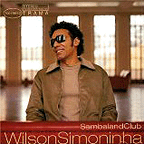 Wilson Simoninha "Sambaland Club" (Trama, 2002)
Wilson Simoninha "Sambaland Club" (Trama, 2002)
One of Wilson Simonal's two musicimaking sons (the other being Max De Castro), Simoninha travels the same roads as his dad, with a diverse mix of danceable soul, disco-y cabaret funk, slower pop tunes and the like. It's a lot like a Portuguese-language of Earth Wind & Fire... Simoninha has a nice voice (reminiscent of his dad, but with more fluid phrasing) but the music doesn't do much for me. Folks who are more into mainstream, modern R&B and soul might like this, though -- it's certainly worth checking out if you are on the clubby tip. Highights include a moody cover of his father's song, "Tributo A Martin Luther King" and a ten-minute long spoken word interview with Miele, about the good old days in the Brazilian nightclub scene. Seu Jorge guests on the bouncy, horn-based opening track, "Seja Bem Vindo."
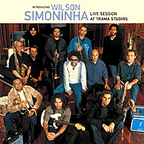 Wilson Simoninha "Introducing Wilson Simoninha: Live Session At Trama Studios" (Trama, 2003)
Wilson Simoninha "Introducing Wilson Simoninha: Live Session At Trama Studios" (Trama, 2003)
A retrospective set that includes re-recordings of work from various albums, and some new material as well. Guest artist Cesar Camargo Mariano plays keyboards on an amped-up version of "Tributo A Martin Luther King" and Simoninha's band, S de Samba, chugs away on a lively set of funk-soul-samba tunes. Simoninha's fusion side comes out a bit more here, as well as a slinky debt to Jorge Ben Jor, and a hint of Joao Bosco, in his mellower moments. Still not anything I'd want to listen to for fun, but I can see where others might really dig it.
Wilson Simoninha "Melhor" (2008)
Simone - see artist discography
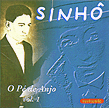 Sinho/Various Artists "Volume 1: O Pe De Anjo" (Revivendo, 1998)
Sinho/Various Artists "Volume 1: O Pe De Anjo" (Revivendo, 1998)
The first of several extraordinary volumes collecting the recorded work of one of the earliest samba cancao composers, Jose Barbosa de Silva, best known by the nom de plume Sinho. These are rather antique recordings, dating from 1920-1930, and include some of the earliest work by legendary singers such as Francisco Alves and Carmen Miranda. It's musically antique as well, with numerous songs that are built on the rickety hulls of old waltzes, and German oompah rhythms. But it grows on you... oh my, how it grows on you!
Sinho "Alivia Estes Olhos" (Revivendo, 1998)
Sinho "Fala Meu Louro" (Revivendo, 1998)
Roberto Sion & Nelson Ayres "E A Musica De..." (Eldorado, 1977) (LP)
The music of Chico Buarque, Caymmi, Tom Jobim, Milton Nascimento, Flavio Venturini, and Vadico...
Roberto Sion "Happy Hour" (Eldorado, 1986)
Roberto Sion "Sion & Companhia" (2007)
With Rogerio Boccato, Fernando Correa, and Alberto Lucca...
Sirlan "Profissao De Fe" (Continental, 1979) (LP)
Sivuca - see artist discography
Skank - see artist discography
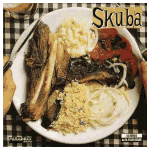 Skuba "Churraskada" (Paradoxx, 1997)
Skuba "Churraskada" (Paradoxx, 1997)
(Produced by Sergio Soffiatti)
Solid modern ska from a cheerful young band from Parana... If you like modern ska, and would like to hear some sung in Portuguese (and occasionally in English...) this is a fine album for you to check out.
Skuba "A Moda Antiga" (1998)
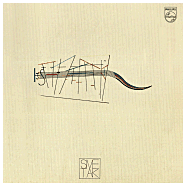 Anton Walter Smetak "Smetak" (Philips, 1974) (LP)
Anton Walter Smetak "Smetak" (Philips, 1974) (LP)
(Produced by Roberto Santana & Caetano Veloso)
Purposefully inaccessible, irritating, artsy improv/electronic noodlings that derive from the post-John Cage school of difficult listening. Apparently some high-powered musicians took part in these sessions, including Gilberto Gil and Djalma Correa, but the album is inherently aimless and un-engaging, at least from my point of view. Smetak's producer and patron, Caetano Veloso, made a similar (but stronger) album a couple of years earlier, called Araca Azul, and while this project shows his continuing interest in experimental music, you're better off checking out Caetano's own work. For diehards only.
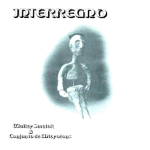 Anton Walter Smetak & Conjunto De Microtons "Interregno" (FCEBA, 1980) (LP)
Anton Walter Smetak & Conjunto De Microtons "Interregno" (FCEBA, 1980) (LP)
Another wanky difficult-listening extravaganza, taxing although better, I would say, than the Smetak album reviewed above. A more pronounced electronic component, for one thing. But still not my cup of tea.
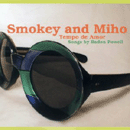 Smokey & Miho "Smokey & Miho" (Afro-Sambas, 2002)
Smokey & Miho "Smokey & Miho" (Afro-Sambas, 2002)
Smokey & Miho "Tempo De Amor" (Afro-Sambas, 2002)
The smooth, versatile rock guitarist Smokey Hormel (known for his work with Tom Waits, Beck, and others) and vocalist Miho Hatori (of Cibo Matto fame) teamed up out of their mutual appreciation for Baden Powell and Vinicius De Moraes' 1966 album, Os Afro Sambas, a bossa classic that remains mysteriously hard to find, even in this golden age of collector reissues. The Smokey & Miho band formed in 2001 to recreate the entire album in a series of live performances; their first 5-song EP, Smokey & Miho, built on the mellow, lounge-y bossa vibe (but was mostly made up of original Hatori-Hormel material, along with a cover of an obscure Angolan pop song by Euclides F. Pereira). On their follow-up EP, they stick to the old stuff, covering four songs off the original Afro Sambas album, as well as a fifth vintage Powell/De Moraes composition, "Consolacao." The entire Tempo De Amor EP is a delight -- Hatori's vocals recapture the feel of the original harmonies by the all-female Quarteto Em Cy, while Hormel's fluid guitar work is able to build upon Powell's haunting music, bringing a new modern warmth to the spooky source material. Fans of classic Brazilian bossa nova should love this affectionate homage. Highly recommended!
 Smokey & Miho "The Two EPs" (Afro-Sambas, 2003)
Smokey & Miho "The Two EPs" (Afro-Sambas, 2003)
Both EPs, Smokey & Miho and Tempo De Amor, gathered together on one standard CD. Groovy!
 Carolina Soares "Musicas De Capoeira" (Paradoxx, 2003)
Carolina Soares "Musicas De Capoeira" (Paradoxx, 2003)
 Carolina Soares "Os 15 Maiores Sucessos Na Capoeira" (HPI, 2008)
Carolina Soares "Os 15 Maiores Sucessos Na Capoeira" (HPI, 2008)
Claudette Soares - see artist discography
Elza Soares - see artist discography
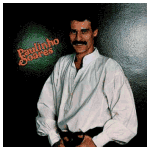 Paulinho Soares "Paulinho Soares" (Continental, 1978) (LP)
Paulinho Soares "Paulinho Soares" (Continental, 1978) (LP)
Despite kicking off with a goofy, disco-tinged samba-rock novelty song ("O Patrao Mandou") this quickly settles into a steady flow of classic, classy '70s-style MPB... Indeed, Soares sounds like a dead ringer for Chico Buarque, both vocally and stylistically. And that ain't a bad thing. Definitely worth a whirl!
Thelma Soares "...Interpreta Nelson Cavaquinho" (1966) (LP)
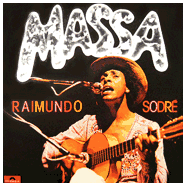 Raimundo Sodre "A Massa" (Polygram, 1980) (LP)
Raimundo Sodre "A Massa" (Polygram, 1980) (LP)
The debut album by this Bahian samba-pop singer, whose first single, "A Massa," was a big hit after being featured in a nationwide MPB festival. That success led to three major-label albums, but Sodre's career was sidelined (some say due to political pressure when he fell afoul of a member of the then-powerful military junta...) and he spent several years abroad before returing to Bahia. Sodre's work mixes dynamic pop styles with Afro-Brazilian rhythms taken from traditional samba de roda (samba circles) and the candomble ceremonies he grew up with... It's pretty cool stuff! (By the way, anyone have a copy of these Polydor albums, or know how I can track them down? I'd love to check them out.)
Raimundo Sodre "Coisa De Nego" (Polygram, 1981) (LP)
Raimundo Sodre "Beijo Moreno" (Polygram, 1983) (LP)
Raimundo Sodre "Real" (Tropical Music, 1994)
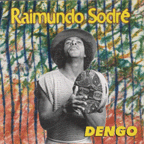 Raimundo Sodre "Dengo" (Self-Released) (2005)
Raimundo Sodre "Dengo" (Self-Released) (2005)
(Produced by Raimundo Sodre & Andrea Caldas)
A great album, filled with lively, life-affirming, booty-shaking, acoustic-based rhythms... The most obvious comparison is to Gilberto Gil's best work from the mid-1970s, but even with the strong similarities, Sodre is very much is own man, and gives a special, unique twist to each of these songs. He really digs deep into the groove, and knows how to glide along the top, dancing with his voice and exploring with his guitar. There's not a bad or boring track on here: if you get this record, you'll love it.
Pedro Sol "Saudade De Laguna" (Revivendo, 2002)
Modern recordings from the Revivendo label? Well, sure, when they're from the nephew of crooner Billy Blanco...! Haven't heard this one yet, but I am curious.
Sombrinha "Sombrinha" (RGE, 1992)
Sombrinha "Roda De Samba Com Sombrinha" (2006)
Som Imaginario - see artist discography
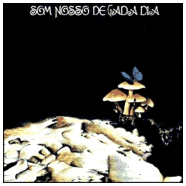 Som Nosso De Cada Dia "SNEGS" (Continental, 1974) (LP)
Som Nosso De Cada Dia "SNEGS" (Continental, 1974) (LP)
(Produced by Julio Nagib & Peninha Schmidt)
The debut album by one of the best Brazilian rock (and funk) bands of the 1970s... Legendary, and -- naturally -- out of print for years. Part of the band came from the remnants of the popular psychedelic/jovem guarda group, Os Incriveis... This is the only album with the band's co-founder, keyboardist/multi-instrumentalist Manito, of Os Incriveis... Haven't heard it yet, but I'm looking forward to the day when it gets reissued, so I can check it out...
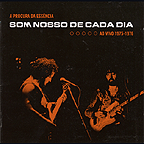 Som Nosso De Cada Dia "A Procura Da Essencia: Ao Vivo 1975-1976" (Editio Princeps, 2004)
Som Nosso De Cada Dia "A Procura Da Essencia: Ao Vivo 1975-1976" (Editio Princeps, 2004)
(Produced by Marcelo Spindola Bacha)
A 2-CD set of live recordings by Som Nosso De Cada Dia, one of the best and most forceful Brazilian prog-rock bands. Moogs and guitars aplenty ride atop a driving, at times brutal, beat... While contemporaries such as Os Mutantes and O Terco slid into a more pop-oriented sound, Som Nosso were far more hard-edged, keeping pace with genre founders such as Return To Forever and Chick Corea, although with an experimental bent that also suggests the work of Can and the krautrock scene, as well as some boogie rock and old-school, Sabbath-y heavy metal. This challenging collection, culled from archival tapes kept by guitarist Egidio Conde, is packed with leviathan jams, ten minutes or longer and a rough-and-rugged feel that's really quite different that practically anything else coming out of Brazil at the time. Not what I'd put on for casual listening, but of immense historical value. (For more information, check out the
Editio Princeps website...) (Note: Egidio Conde was formerly in the band Moto Perpetuo...)
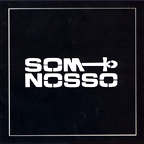 Som Nosso De Cada Dia "Som Nosso" (Columbia Records, 1977) (LP)
Som Nosso De Cada Dia "Som Nosso" (Columbia Records, 1977) (LP)
(Produced by Tony Bizarro)
One of the best, most challenging, most satisfying of the classic Brazilian soul/funk albums... But that's only half the story! Apparently this album is a patchwork effort, made up of an earlier album (Amazonia) that was shelved by their old label, and new material (the funk stuff) that CBS thought would be more salable... After laying down some groovy, innovative, multi-textured funk, the Som Nosso band shift gears on the second side of the album and get into some spacey, noodly, occasionally shrill prog-rock... Like their funk music, though, the prog material is rather accomplished, and stands up quite well next to the krautrock or what-have-you that was going on elsewhere at the time. Only one track is outright irritating: "Agua Limpa" gets a little longwinded and facile, sounding less like Can and more like Yes or Emerson, Lake & Palmer... Otherwise, this disc is a real find for '70s-aholic music geeks. Definitely worth tracking down!
Som Nosso De Cada Dia "Ao Vivo No Aquarius" (Museo Do Disco, 2011)
A live album, recorded in 1976 at the Teatro Aquarius, this went unreleased until 2011... The lineup included Pedrao Baldanza (bass), Pedrinho Batera (drums), Edydio Conde (guitar), Rangel (percussion) and Dino Vincente (keyboards), with vocal chores spread out through the band...
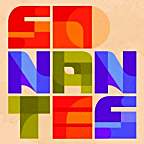 Sonantes "Sonantes" (Six Degrees, 2008)
Sonantes "Sonantes" (Six Degrees, 2008)
A Brazilian pop/electronica album unlike any you've heard before, infused with the slinky, cross-cultural feel of international soundtrack music, tinged with rock, funk, blues and dub. Vocalist CeU resurfaces in the company of numerous pop innovators from Sao Paulo, notably members of Nacao Zumbi, Rica Amabis of the band Instituto and several guest performers such as Mestre Ambrosio's Siba, and electronic-popster Apollo Nove. CeU shines throughout, but particularly while riding atop the buoyant, ecstatic "Quilombo Te Espera," a song that leaps out at listeners midway through the album, and pulls them in with its radiant cheerfulness. Other standout tracks include the surf-flavored instrumental, "Looks Like To Kill," and "Defenestrando," a sly, slinky jazz-funk workout with a slithering guitar line worthy of the Talking Heads in their art-funk heyday. On "Miopia," CeU shares the limelight with Mestre Ambrosio's Siba, who contributes haunting vocals that evoke the arid feel of Brazil's northeastern provinces. The album darkens towards the end, particularly on the spooky, ethereal "Itapeva," but closes on a sleek, blithe bit of retro-tropical pop, "Frevo De Saudade," which nonetheless has a kooky rhythmic undercurrent that again shows the skillful eclelcticism of this surprising ensemble. Highly recommended!
So Pra Contrariar - see artist discography
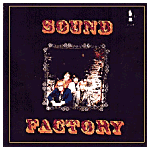 Sound Factory "Sound Factory" (Castelinho, 1970) (LP)
Sound Factory "Sound Factory" (Castelinho, 1970) (LP)
(Produced by Raimundo Bittencourt)
An intensely irritating psychedelic/hard rock band which, despite dripping with hippie-era authenticity, is pretty hard to listen to, lo, these many decades later. The band included a couple of North Americans, but was mostly the baby of singers Antonio Ricardo Canizio Sampaio (who played bass) and drummer Trajano Luis Lemos Junior, both of whom lamentably chose to sing in English, a decision that only underscored their whiniest vocal qualities. I suppose, even with the piercing guitars and thudding drums, that I might have enjoyed this better if they had covered the work of Traffic, Cream, Blind Faith and Jefferson Airplane (along with a few others) in Portuguese -- that might have added a layer of mystery to the recordings... But as it is, this album radiates the band's huge enthusiasm for English and American rock (and their good taste, given the era this was made) but also throws into sharp relief their musical limitations. This is considered a landmark in Brazilian rock, but I found it pretty rough going. More notably, perhaps, are two original songs written by guitarist Kevin Valentine Peter Brennan, "Restless Time" and the dynamic "Let's Go," which is perhaps the best performance on here.
Luciana Souza "An Answer To Your Silence" (NYC Music, 1999)
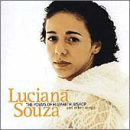 Luciana Souza "The Poems Of Elizabeth Bishop And Other Songs" (Sunnyside Records, 2000)
Luciana Souza "The Poems Of Elizabeth Bishop And Other Songs" (Sunnyside Records, 2000)
Singing in English, Brazilian-born vocalist Luciana Souza leads this jazz-soaked tribute to American poet Elizabeth Bishop, who lived as an expatriate in Brazil for nearly two decades in the 1950s and '60s, and was a figure of considerable controversy in Brazilian literary circles. On some of these tracks, Souza's amorphous, scatting approach may obscure the lyrics, although on other songs, particularly the slower ballads, Bishop's verses lend themselves admirably to musical interpretation. In addition to the adapted poems, this disc also features several straight jazz instrumentals, generally of a free-form, exploratory nature. An interesting project, and one which may help draw new attention to this contemplative, notoriously un-prolific, and somewhat tragic writer.
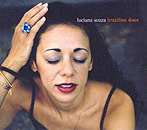 Luciana Souza "Brazilian Duets" (Sunnyside Records, 2001)
Luciana Souza "Brazilian Duets" (Sunnyside Records, 2001)
A beautiful acoustic album which draws songs from sources as varied as Luiz Gonzaga, Edu Lobo, Dorival Caymmi and Jacob do Bandolim, a fine mix of jazz and traditional Brazilian sensibilities. The duets are between Paulista singer Luciana Souza and the guitars of Romero Lubambo, Marco Pereira and Souza's father, composer Walter Santos. Souza is a striking vocalist whose clarity of tone brings to mind Joyce and Clara Nunes, although with a clarity of purpose that makes this album all her own. Each guitarist in his turn proves a sympathetic foil to Ms. Souza's honied voice... A lovely, wonderfully controlled and expressive set of songs -- highly recommended! Visit her website for more information.
Luciana Souza "North And South" (Sunnyside Records, 2003)
Luciana Souza "Neruda" (Sunnyside Records, 2004)
Luciana Souza "Duos II" (Sunnyside Records, 2005)
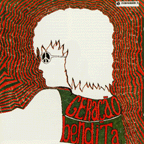 Spectrum "Geracao Bendita" (Todamerica, 1971) (LP)
Spectrum "Geracao Bendita" (Todamerica, 1971) (LP)
(Produced by A. Schneider & Luiz Carlos)
If nothing else, this psychedelic relic has a very colorful back story... The group Spectrum were one of many bands drawn into the orbit of Brazil's coastal hippie colony Nova Friburgia, Rio's version of the Dutch alternative lifestyle enclave of Christiania. What distinguished Spectrum was that they were chosen to provide the soundtrack to Carlos Bini's documentary film, Geracao Bendita, which captured the chaotic idealism of the experimental commune. The music itself is pretty good, with loudly aggressive acid rock guitars, more in line with the hard rock and proto-metal of Iron Butterfly and Led Zeppelin than with the Beatles-y tendencies of the MPB-bound tropicalistas. At any rate, this disc is worth tracking down, as very few Brazilian bands hit such heavy, fuzzed-out psychedelic heights. Fans of Os Mutantes, etc., will definitely want to check this out.
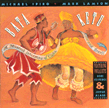 Michael Spiro & Mark Lamson "Bata Ketu" (Bembe, 1996)
Michael Spiro & Mark Lamson "Bata Ketu" (Bembe, 1996)
A skillful, melodic intertwining of Afro-Cuban and Afro-Brazilian Yoruba percussion, featuring guest vocals by Bobi Cespedes, of the Bay Area ensemble, Conjunto Cespedes. The project is slanted towards the Cuban side, but the group introduces Brazilian elements (berimbau, proto-samba percussive meters) with such subtlety that it is often surprising to realize that the transition or synthesis has been made. I am not usually that into percussion-based albums, but this one is a real treat. Recommended!
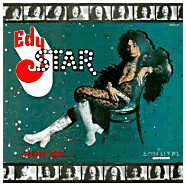 Edy Star "Sweet Edy" (Som Livre, 1974) (LP)
Edy Star "Sweet Edy" (Som Livre, 1974) (LP)
Brazilian glam... to the umpteenth degree! Edivaldo Souza, aka Edy Star, was a Bahian actor and dancer who starred in the first Brazilian stage production of "The Rocky Horror Picture Show" and was a participant in the group of crazies who made Raul Seixas's fabled first album, Sociedade Da Gra-Ordem Kavernista Apresenta Sessao Das 10, the one that got Seixas fired from his day job at CBS records. Anyway, Edy Star was a Bowie-esque persona adopted in the early '70s both for this album, and for subsequent work onstage. (Reissued on Tratore records.)
Guga Stroeter - see artist discography
Rodolfo Stroeter "Mundo" (Continental) (LP)
Rodolfo Stroeter/Diego Figueiredo/Robertinho Silva "Dadaio" (Stunt Records, 2009)
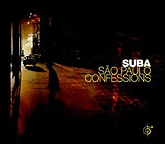 Suba "Sao Paulo Confessions" (Ziriguiboom/Six Degrees, 2000)
Suba "Sao Paulo Confessions" (Ziriguiboom/Six Degrees, 2000)
Soft-soul electronica with wispy female vox. The mixer, Yugoslavian expatriate Mikar Subotic (aka Suba), died in an apartment fire in Brazil during the winter of '99, and this album is his recorded legacy. One wonders though, comparing the strength of the first few tracks with the album's somewhat formless second half, if all these tracks got all the attention they deserved before his untimely death. On the best vocal cuts, this seems like a logical '90s extension of the old Astrud Gilberto sound, with silken, synthetic sound beds in place of sax and strings. The instrumental numbers, on the other hand, tend to be a bit flat, as does a version of "A Felicidade" which somehow manages to denude the Jobim standard of its melody. Art rocker Arnaldo Antunes pitches in on one track, with his patented Beat Happening-croaky voice. Trip-hoppers may go for this more than I did, though I do think there are some lovely moments to be heard here.
 Suba "Felicidade Remixes (EP)" (Ziriguiboom/Six Degrees, 2000)
Suba "Felicidade Remixes (EP)" (Ziriguiboom/Six Degrees, 2000)
Remixes. Of "Felicidade."
 Suba/Various Artists "Tributo" (Ziriguiboom/Six Degrees, 2002)
Suba/Various Artists "Tributo" (Ziriguiboom/Six Degrees, 2002)
 Super Som T. A. "T.A." (RGE-Premier, 1974) (LP)
Super Som T. A. "T.A." (RGE-Premier, 1974) (LP)
 Super Som T. A. "Danca Que Eu Quero Ver" (RGE-Premier, 1991) (LP)
Super Som T. A. "Danca Que Eu Quero Ver" (RGE-Premier, 1991) (LP)
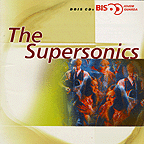 The Supersonics "Serie Bis" (EMI, 1999)
The Supersonics "Serie Bis" (EMI, 1999)
A fun, dumb 2-CD set devoted to The Supersonics, a jovem guarda instrumental/covers band, which apparently was really The Fevers playing incognito... Plenty of standards, both from the American/British rock scene, and the Brazilian ie ie ie canon... They sing sometimes, too, and that's where some of the biggest missed moments come -- for example, a cover of "Dizzy" sung in English (and not in Portuguese! d'oh!) Still, if you've been bitten by the JG bug, you'll want to check this out.
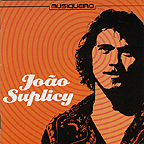 Joao Supplicy "Musiqueiro" (ST2, 1999)
Joao Supplicy "Musiqueiro" (ST2, 1999)
Good-natured, tropicalia-tinged rock'n'reggae from Sao Paulo... There's a wide range of styles on here, from bouncy alt-pop and ska to funky spy-jazz retro (particularly on "Vozes," one of the album's highlights...) This gets a little goofy in places, but mostly it's pretty solid, with nice, dubby production. If you want to sample some of the new indie-oriented rock coming out of Brazil, this record is worth checking out.
Joao Supplicy "Cafezinho" (Tratore, 2004)
Joao Supplicy "Caseiro" (Tratore, 2005)
Joao Supplicy "Elvis In Bossa: Love Me Tender" (Universal, 2006)
Supula "Bossa Furiosa" (ST2, 2003)
Tia Surica "Surica" (Rob Digital, 2004)
(Produced by Paulo Sete Cordas)
An elder of the Portela samba school, Iranette Ferreira Barcellos (aka Tia Surica) has been singing in Carnaval shows since the 1940s; this is the latest of her solo works, in a recording career that stretches back to the '50s.
Sururu E Tal "Situacao" (2007)
Not sure, but I think this is a Brazilian reggae album...
Sururu Na Roda "Sururu Na Roda" (Rob Digital, 2004)
Sururu Na Roda "Arco Da Velha" (Futura, 2005)
Sururu Na Roda "Que Samba Bom -- Ao Vivo" (Universal, 2008)
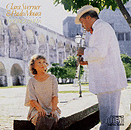 Clara Sverner & Paulo Moura "Interpretam Pixinguinha" (CBS, 1988)
Clara Sverner & Paulo Moura "Interpretam Pixinguinha" (CBS, 1988)
Wow! A beautiful, very striking set of piano-clarinet duets which slyly interweaves Pixinguinha oldies with North American Tin Pan Alley standards. Clara Sverner has a brisk, decisive, Gershwinesque flair, and she and Moura are clearly very much in synch. Delightfully playful, lively takes on these old, familiar themes. Certainly one of the most enjoyable choro albums I've ever heard, neither saccharine nor severe. Highly recommended.
Clara Sverner "Mitos & Musicas" (1996)
Clara Sverner "Alma Brasileira" (Sony Classics, 1999)
Sverner plays the music of Heitor Villa-Lobos...
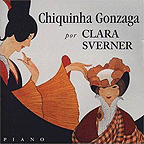 Clara Sverner "Chiquinha Gonzaga Por Clara Sverner" (Ergo/Abril, 1999)
Clara Sverner "Chiquinha Gonzaga Por Clara Sverner" (Ergo/Abril, 1999)
Classical pianist Clara Sverner, who has explored the work of Pixinguinha in a series of collaborations with Paulo Moura, here turns her hand towards the work of another legendary, foundational figure in the evolution of Brazilian popular music. In her day, composer Chiquinha Gonzaga fused indigenous themes with the dominant European forms -- the waltz, the polka, etc. -- helping to create the modern styles that Brazilian pop is built apon: the samba, the maxixe and choro. These tunes were originally composed between 1877-1902, a time when Brazilian music was undergoing tremendous subterranean shifts, yet before the advent of the record industry. Sverner's interpretations are beautiful, though a bit prim; you may be reminded of Max Morath's famous renditions of Scott Joplin's ragtime ouvre... I liked this album, although I felt it tilted more towards the classical end of the spectrum... You might also like to check out the magnificent Gonzaga retrospective that the Revivendo label put out a few years ago...
 Sa, Rodrix & Guarabira "Sa, Rodrix & Guarabira" (EMI, 2003)
Sa, Rodrix & Guarabira "Sa, Rodrix & Guarabira" (EMI, 2003)
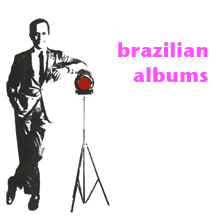
 Sa & Guarabyra "O Melhor De..." (BMG-RCA, 1997)
Sa & Guarabyra "O Melhor De..." (BMG-RCA, 1997)
 Marcos Sacramento & Mauricio Carrilho "A Modernidade Da Tradicao" (Buda Musique, 1994)
Marcos Sacramento & Mauricio Carrilho "A Modernidade Da Tradicao" (Buda Musique, 1994)
 Monica Salmaso "Trampolim" (Blue Jackel Records, 1999)
Monica Salmaso "Trampolim" (Blue Jackel Records, 1999)
 Monica Salmaso "Iaia" (Biscoito Fino/Adventure Music, 2004)
Monica Salmaso "Iaia" (Biscoito Fino/Adventure Music, 2004)
 Samba 5 "Moderninho" (Tropicana, 1970) (LP)
Samba 5 "Moderninho" (Tropicana, 1970) (LP)
 Sambalanco Trio "Sambalanco Trio" (Audio Fidelity, 1964)
Sambalanco Trio "Sambalanco Trio" (Audio Fidelity, 1964)
 Sambalanco Trio & Lennie Dale "Lennie Dale E O Sambalanco Trio" (Elenco, 1965) (LP)
Sambalanco Trio & Lennie Dale "Lennie Dale E O Sambalanco Trio" (Elenco, 1965) (LP)
 Samba Meets Boogie Woogie "Samba Meets Boogie Woogie" (Adventure Music, 2008)
Samba Meets Boogie Woogie "Samba Meets Boogie Woogie" (Adventure Music, 2008)
 Os Sambistas "Os Sambistas" (Solid Air, 2008)
Os Sambistas "Os Sambistas" (Solid Air, 2008)
 Os Sambistas Da Guanabara "O Show De Samba, v.2" (EMI-Odeon, 1964) (LP)
Os Sambistas Da Guanabara "O Show De Samba, v.2" (EMI-Odeon, 1964) (LP)
 Os Sambistas Do Asfalto "Assim E O Samba" (Damic, 1960) (LP)
Os Sambistas Do Asfalto "Assim E O Samba" (Damic, 1960) (LP)
 Sambrasa Trio "Sambrasa Trio Em Som Maior" (Som Maior, 1966) (LP)
Sambrasa Trio "Sambrasa Trio Em Som Maior" (Som Maior, 1966) (LP)
 Sandra "Samba Em 35mm" (Pawal, 1960-?)
Sandra "Samba Em 35mm" (Pawal, 1960-?)
 Fernando Sanjines & Samba Do Coracao "Heartbeat Of The Jaguar" (
Fernando Sanjines & Samba Do Coracao "Heartbeat Of The Jaguar" ( Sansa Trio "Sansa Trio" (Som Maior, 1965)
Sansa Trio "Sansa Trio" (Som Maior, 1965)
 Sansa Trio "Sansa Trio, v.2" (Som Maior, 1966)
Sansa Trio "Sansa Trio, v.2" (Som Maior, 1966)
 Daniel Santiago "On The Way" (Adventure Music/Brasilianos, 2006)
Daniel Santiago "On The Way" (Adventure Music/Brasilianos, 2006)
 Elymar Santos "Serie Bis" (EMI, 2000)
Elymar Santos "Serie Bis" (EMI, 2000)
 Luiz Santos "Afro Brazilian Explosion" (2009)
Luiz Santos "Afro Brazilian Explosion" (2009)
 Moacir Santos "Ouro Negro" (Universal/Petrobras, 2001) (Adventure Music-US, 2004)
Moacir Santos "Ouro Negro" (Universal/Petrobras, 2001) (Adventure Music-US, 2004)
 Moacir Santos "Choros & Alegria" (Adventure Music, 2005)
Moacir Santos "Choros & Alegria" (Adventure Music, 2005)
 Pedro Santos "Krishnanda" (CBS, 1968) (LP)
Pedro Santos "Krishnanda" (CBS, 1968) (LP)
 Sergio Santos "Eu E A Musica" (Blue Jackel, 1998)
Sergio Santos "Eu E A Musica" (Blue Jackel, 1998)
 Sergio Santos "Africo: Quando O Brasil Resolveu Cantar" (Biscoito Fino, 2002)
Sergio Santos "Africo: Quando O Brasil Resolveu Cantar" (Biscoito Fino, 2002)
 Sonia Santos "Crioula" (Som Livre, 1977) (LP)
Sonia Santos "Crioula" (Som Livre, 1977) (LP)
 Turibio Santos "Villa Lobos: Sexteto Mistico/Preludios" (RCA/MIS, 1971) (LP)
Turibio Santos "Villa Lobos: Sexteto Mistico/Preludios" (RCA/MIS, 1971) (LP)
 Turibio Santos "Choros Do Brasil" (Tapecar, 1977) (LP)
Turibio Santos "Choros Do Brasil" (Tapecar, 1977) (LP)
 Vittor Santos "Renewed Impressions/Renovando As Consideracoes" (Adventure Music, 2006)
Vittor Santos "Renewed Impressions/Renovando As Consideracoes" (Adventure Music, 2006)
 Walter Santos "Bossa Nova" (Audio Fidelity, 1963) (LP)
Walter Santos "Bossa Nova" (Audio Fidelity, 1963) (LP)
 Sao Paulo Underground "Sauna: Um, Dois, Tres" (Submarine/Aesthetics, 2006)
Sao Paulo Underground "Sauna: Um, Dois, Tres" (Submarine/Aesthetics, 2006)
 Sargentelli "Oba Oba O Q.G. Do Samba" (Continental, 1975) (LP)
Sargentelli "Oba Oba O Q.G. Do Samba" (Continental, 1975) (LP)
 Nelson Sargento "Memoria Eldorado: Sonho De Um Sambista" (Eldorado, 1979) (LP)
Nelson Sargento "Memoria Eldorado: Sonho De Um Sambista" (Eldorado, 1979) (LP)
 Nelson Sargento/Elton Medeiros/Galo Preto "So Cartola" (Rob Digital, 1999)
Nelson Sargento/Elton Medeiros/Galo Preto "So Cartola" (Rob Digital, 1999)
 Nelson Sargento "Flores Em Vida" (Selos Radio MEC/Discos Rob, 2002)
Nelson Sargento "Flores Em Vida" (Selos Radio MEC/Discos Rob, 2002)
 Almir Sater "Ao Vivo" (Columbia Records, 1992)
Almir Sater "Ao Vivo" (Columbia Records, 1992)
 Satwa "Satwa" (Rosemblit, 1973) (LP)
Satwa "Satwa" (Rosemblit, 1973) (LP)
 Claudia Savaget "Samambaias" (Tapecar, 1978) (LP)
Claudia Savaget "Samambaias" (Tapecar, 1978) (LP)
 Os Saxsambistas Brasileiros "Sax Sambando" (Plaza, 1960) (LP)
Os Saxsambistas Brasileiros "Sax Sambando" (Plaza, 1960) (LP)
 Lalo Schifrin "Brazilian Jazz" (Aleph, 2000)
Lalo Schifrin "Brazilian Jazz" (Aleph, 2000)
 Scottinho "Batizado" (Homen De Ouro, 2003)
Scottinho "Batizado" (Homen De Ouro, 2003)
 Paulo Sergio "Serie Bis - Jovem Guarda" (EMI, 2000)
Paulo Sergio "Serie Bis - Jovem Guarda" (EMI, 2000)
 Severino Filho "Rio De Janeiro, Gosto De Voce" (Polydor, 1958) (LP)
Severino Filho "Rio De Janeiro, Gosto De Voce" (Polydor, 1958) (LP)
 Sexteto De Jazz Moderno "Bossa Nova" (RCA Victor, 1963) (LP)
Sexteto De Jazz Moderno "Bossa Nova" (RCA Victor, 1963) (LP)
 Wayne Shorter "Native Dancer" (Columbia Records, 1975) (LP)
Wayne Shorter "Native Dancer" (Columbia Records, 1975) (LP)
 Anisio Silva "Serie Bis" (EMI, 2000)
Anisio Silva "Serie Bis" (EMI, 2000)
 Anisio Silva "2-Em-1: Alguem Me Disse/Dois Milhoes De Discos Vendidos" (EMI, 2003)
Anisio Silva "2-Em-1: Alguem Me Disse/Dois Milhoes De Discos Vendidos" (EMI, 2003)
 Ismael Silva "Se Voce Jurar" (RCA, 1973) (LP)
Ismael Silva "Se Voce Jurar" (RCA, 1973) (LP)
 Mara Silva "Sucessos Em Teleco-Teco" (Copacabana, 1962) (LP)
Mara Silva "Sucessos Em Teleco-Teco" (Copacabana, 1962) (LP)
 Osny Silva "Bandolins Ao Luar" (Revivendo)
Osny Silva "Bandolins Ao Luar" (Revivendo)
 Patapio Silva "Flauta Imortal" (Revivendo, 1996)
Patapio Silva "Flauta Imortal" (Revivendo, 1996)
 Robertinho Silva "Perigo De Goal (Shot On Goal)" (Fantasy-Milestone, 1995)
Robertinho Silva "Perigo De Goal (Shot On Goal)" (Fantasy-Milestone, 1995)
 Roberto Silva "Descendo O Morro" (EMI/Copacabana, 1958) (LP)
Roberto Silva "Descendo O Morro" (EMI/Copacabana, 1958) (LP)
 Roberto Silva "Serie Bis - Cantores Do Radio" (EMI/Copacabana, 2000)
Roberto Silva "Serie Bis - Cantores Do Radio" (EMI/Copacabana, 2000)
 Synval Silva "Synval Silva" (EMI, 1973) (LP)
Synval Silva "Synval Silva" (EMI, 1973) (LP)
 Jussara Silveira "Jussara" (Maianga, 2002)
Jussara Silveira "Jussara" (Maianga, 2002)
 Orlando Silveira & SOS "Band It" (Parlophone, 1974) (LP)
Orlando Silveira & SOS "Band It" (Parlophone, 1974) (LP)
 Ricardo Silveira "Amazon Secrets" (Polygram, 1990)
Ricardo Silveira "Amazon Secrets" (Polygram, 1990)
 Ricardo Silveira & Luiz Avellar "Play The Music Of Milton Nascimento - Live" (Adventure Music, 2004)
Ricardo Silveira & Luiz Avellar "Play The Music Of Milton Nascimento - Live" (Adventure Music, 2004)
 Ricardo Silveira "Outro Rio" (Adventure Music, 2007)
Ricardo Silveira "Outro Rio" (Adventure Music, 2007)
 The Silvery Boys "De Com Forca... Pra Frente" (RGE, 1967) (LP)
The Silvery Boys "De Com Forca... Pra Frente" (RGE, 1967) (LP)
 Simonetti & Orquestra RGE "Brasil Musical" (RGE, 1960) (LP)
Simonetti & Orquestra RGE "Brasil Musical" (RGE, 1960) (LP)
 Wilson Simoninha "Sambaland Club" (Trama, 2002)
Wilson Simoninha "Sambaland Club" (Trama, 2002)
 Wilson Simoninha "Introducing Wilson Simoninha: Live Session At Trama Studios" (Trama, 2003)
Wilson Simoninha "Introducing Wilson Simoninha: Live Session At Trama Studios" (Trama, 2003)
 Sinho/Various Artists "Volume 1: O Pe De Anjo" (Revivendo, 1998)
Sinho/Various Artists "Volume 1: O Pe De Anjo" (Revivendo, 1998)
 Skuba "Churraskada" (Paradoxx, 1997)
Skuba "Churraskada" (Paradoxx, 1997)
 Anton Walter Smetak "Smetak" (Philips, 1974) (LP)
Anton Walter Smetak "Smetak" (Philips, 1974) (LP)
 Anton Walter Smetak & Conjunto De Microtons "Interregno" (FCEBA, 1980) (LP)
Anton Walter Smetak & Conjunto De Microtons "Interregno" (FCEBA, 1980) (LP)
 Smokey & Miho "Smokey & Miho" (Afro-Sambas, 2002)
Smokey & Miho "Smokey & Miho" (Afro-Sambas, 2002)
 Paulinho Soares "Paulinho Soares" (Continental, 1978) (LP)
Paulinho Soares "Paulinho Soares" (Continental, 1978) (LP)
 Raimundo Sodre "A Massa" (Polygram, 1980) (LP)
Raimundo Sodre "A Massa" (Polygram, 1980) (LP)
 Raimundo Sodre "Dengo" (Self-Released) (2005)
Raimundo Sodre "Dengo" (Self-Released) (2005)
 Som Nosso De Cada Dia "SNEGS" (Continental, 1974) (LP)
Som Nosso De Cada Dia "SNEGS" (Continental, 1974) (LP)
 Som Nosso De Cada Dia "A Procura Da Essencia: Ao Vivo 1975-1976" (Editio Princeps, 2004)
Som Nosso De Cada Dia "A Procura Da Essencia: Ao Vivo 1975-1976" (Editio Princeps, 2004)
 Som Nosso De Cada Dia "Som Nosso" (Columbia Records, 1977) (LP)
Som Nosso De Cada Dia "Som Nosso" (Columbia Records, 1977) (LP)
 Sonantes "Sonantes" (Six Degrees, 2008)
Sonantes "Sonantes" (Six Degrees, 2008)
 Sound Factory "Sound Factory" (Castelinho, 1970) (LP)
Sound Factory "Sound Factory" (Castelinho, 1970) (LP)
 Luciana Souza "The Poems Of Elizabeth Bishop And Other Songs" (Sunnyside Records, 2000)
Luciana Souza "The Poems Of Elizabeth Bishop And Other Songs" (Sunnyside Records, 2000)
 Luciana Souza "Brazilian Duets" (Sunnyside Records, 2001)
Luciana Souza "Brazilian Duets" (Sunnyside Records, 2001)
 Spectrum "Geracao Bendita" (Todamerica, 1971) (LP)
Spectrum "Geracao Bendita" (Todamerica, 1971) (LP)
 Michael Spiro & Mark Lamson "Bata Ketu" (Bembe, 1996)
Michael Spiro & Mark Lamson "Bata Ketu" (Bembe, 1996)
 Edy Star "Sweet Edy" (Som Livre, 1974) (LP)
Edy Star "Sweet Edy" (Som Livre, 1974) (LP)
 Suba "Sao Paulo Confessions" (Ziriguiboom/Six Degrees, 2000)
Suba "Sao Paulo Confessions" (Ziriguiboom/Six Degrees, 2000)
 The Supersonics "Serie Bis" (EMI, 1999)
The Supersonics "Serie Bis" (EMI, 1999)
 Joao Supplicy "Musiqueiro" (ST2, 1999)
Joao Supplicy "Musiqueiro" (ST2, 1999)
 Clara Sverner & Paulo Moura "Interpretam Pixinguinha" (CBS, 1988)
Clara Sverner & Paulo Moura "Interpretam Pixinguinha" (CBS, 1988)
 Clara Sverner "Chiquinha Gonzaga Por Clara Sverner" (Ergo/Abril, 1999)
Clara Sverner "Chiquinha Gonzaga Por Clara Sverner" (Ergo/Abril, 1999)


